#because I want to give it to Derek Jacobi
Text
What does Aziraphale know and when does he know it? Part 4: The Aftermath
Prologue, Part 1, Part 2, and Part 3, for those who need them.
After Crowley strides out, Aziraphale has a lot going on in his head still, and it shows on his poor devastated angry (he is angry, just a bit) face.
Then the Metatron comes back in, and Zira has to turn sharply away to pull himself back into some kind of kayfabe. "How did he take it?" the Metatron asks cheerfully, despite already knowing because he was watching. Jehoshaphat, y'all, I thought s1!Gabriel was punchable -- I want to drop the Metatron into Earth-core magma like Gollum at this point!
Aziraphale's heroic efforts at kayfabe are pretty successful, on the whole, but it hurts to see him stiff as a board, arms at his sides, letting the Metatron (argh, so punchable) insult Crowley and laughing nervously. Then the Metatron starts forcing him out the door again with "Right, ready to start?" The presumptuous wretch doesn't even wait for a yes -- just assumes it!
Aziraphale, however, knows he never said yes, so he tries playing for -- anything, really, more information or some kind of choice (arc word! arc! word!) or anything at all. No dice; the Metatron highhandedly gives his bookshop (his. BOOK. SHOP.) to Muriel. Aziraphale now knows why the Metatron wanted Muriel to stay behind on Earth, and he also knows that the Metatron will stop at nothing and trample anyone to get what he wants. Not comforting knowledge, that.
And Aziraphale, having essentially no more choice (I repeat: arc word!), but still horribly torn because he never got to make a decision about the job offer, still doesn't have a Metatron-thwarting plan, and wants Crowley with all his mind and heart, blurts "I think I --" Then he drops back into kayfabe, following the extremely punchable Metatron out the door.
Crowley's still there, standing by the Bentley. All our hearts shatter. But the extremely punchable Metatron (have I mentioned that he is extremely punchable?) keeps Aziraphale moving along by dropping hints at answers to his continuing questions: whatever the Metatron's up to, it's something to do with the Great Plan.
Aziraphale asks. And now that he's firmly in the Metatron's clutches, the Metatron answers: it's the Second Coming.
Watch Aziraphale drop kayfabe (fortunately, the Metatron isn't looking at him) for a look of helpless dismay. A.Z. "entire collection of Bibles, wicked and otherwise" Fell knows what that means! Watch him re-establish kayfabe when the Metatron looks at him from the elevator. Watch him turn back toward Crowley to tell him (unnecessary -- Crowley knows from his visit Upstairs -- but Aziraphale doesn't know Crowley knows), then decide (with another of those pulling-himself-together deep breaths) that he must instead play along. Watch him kayfabe-smile at the Metatron and enter the elevator.
And watch kayfabe warring with devastation and guardianly determination in Aziraphale's face over the credits. My read -- you may have a different one -- is that determination wins, and the eventual smile is an "okay, now I have a plan" smile.
Watch out, Metatron. Aziraphale's gonna wreck you and I'm gonna enjoy it.
-------------------------------------------
This interpretation of the Final Fifteen Minutes is parsimonious. It works with what's there onscreen, not assuming much beyond that -- the only Caveat About Offscreen Shenanigans I left in was to note that we don't necessarily see the entire chinwag. Exactly zero of the twistier, more elaborate fan theories, you may have noticed, made it into this meta -- heck, we don't even have to assume we didn't see the entire chinwag! We might have! What we did see was enough to lead to these outcomes!
The Gaiman-Pratchett-Finnemore brain trust likes jigsaw-puzzle plots where everything has its place and little or nothing is wasted. That's a big reason I think a parsimonious interpretation is likely to be close to a true interpretation. It's all there; why get wild if there's no need to?
This also aligns with what Michael Sheen has said (do please read this not-mine meta, it's lovely) about angels and goodness and making choices. I, too, want Aziraphale to have made the hard, hurting, noble choice at last, even if he was partly railroaded into it.
(Anyone who doesn't care for fan theories should stop reading now, with my effusive gratitude for making it this far.)
That said, the explosion of fan theories about the Final Fifteen Minutes also demonstrates that this interpretation is narratively accommodating. It doesn't have to assume poisoned or drugged coffee, but it doesn't preclude that. It doesn't require a body swap, but it allows it -- all that really has to change is the estimation of who's doing how much kayfabe when. It doesn't need some massive season-spanning conspiracy arc, but if there is one, it can make that work.
Neil knows fandom, none better. He knows we love our meta and our theories. So I have no trouble believing he wrote us a narratively accommodating finale so we could get our book-length Tumblr posts on. Appreciate it, and you, Neil.
#gos2spoilers#gos2 spoilers#good omens season 2 spoilers#the fucking metatron#the final fifteen minutes#good omens meta#good omens#aziraphale#crowley#ineffable husbands#the EXTREMELY PUNCHABLE metatron#seriously is there a bafta for playing the most punchable character#because I want to give it to Derek Jacobi
357 notes
·
View notes
Note
Hi, Neil! You've mentioned that Brian May was initially reluctant to give you permission to use Queen's music in the miniseries (because of competition with the Bohemian Rhapsody film, I think?) but I don't remember you ever telling us why he finally relented. Unless it involves a secret phrase not unlike why the sheep finally obeyed Babe the pig, how did you get him to change his mind?
He wouldn't let us use Queen when we did the BBC Radio 4 adaptation. He was concerned that people might think that Queen was being made fun of, or that Queen was being seen as something old-fashioned or something. For Good Omens the TV show I wrote him a letter, which said...
Dear Brian
Terry Pratchett and I had a private joke, back in the 80s, that any cassette in your car would eventually turn into Queen's Greatest Hits. We put the joke into our cowritten novel GOOD OMENS, and wove a certain amount of Queen magic through the book. Done because, pretty obviously, we love Queen. The book went on to sell enormous numbers over the years, and whenever two Good Omens fans got together, they would talk about Queen.
I know that when Dirk Maggs approached you when he did the Radio 4 adaptation of GOOD OMENS, you were wary about getting involved, due to concerns about, well cassettes, and the possibility of it positioning Queen in people's minds as something old fashioned or silly.
Which, I thought, when Dirk told me about it, was fair enough.
I've now spent the better part of the last four years writing scripts for, and shooting, a TV adaptation of GOOD OMENS. It stars Michael Sheen, David Tennant, Miranda Richardson, Adria Arjana, Michael McKean, Derek Jacobi, Jon Hamm, Nick Offerman, and lots of other amazing people, and it will be narrated by Frances McDormand. It is directed by Emmy-award-winning Douglas Mackinnon.
Douglas loves Queen. I love Queen. David Arnold loves Queen.
And the millions upon millions of Good Omens fans around the world love Queen too. So we have put various moments in there just for them (including a brass band playing "Lazing on a Sunday Afternoon"). We want Queen music to comment on the action.
The show will come out from Amazon, and then from the BBC, next year. This year we are in post-production.
We'd love to show you some of what we've got. We'd love to pick your brains and to get your take on what we're doing. To find out if there's a way we can include you, or just brief you on what we've planned so far.
And Brian cheerfully apologised for having said no before, and said yes.
(Queen didn't want us to use the song Bohemian Rhapsody initially, because of concerns about the movie, but after a while they were happy even with that.)
5K notes
·
View notes
Text
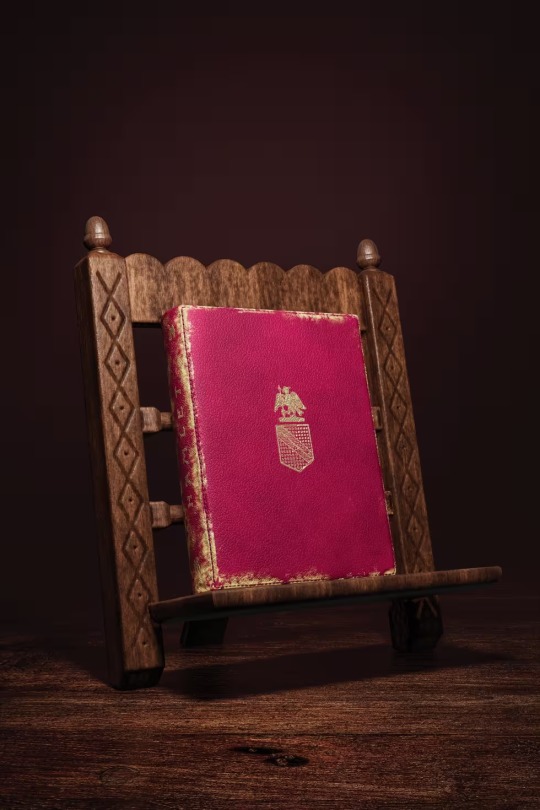
“It must have been in about 1979, I was in New York on holiday. I was sitting up with a friend, and we were both stoned as owls.” Jane Wymark was retelling her brush with a piece of theatre history. She recalled the sound of a telephone cutting through the sour, rising smoke. Wymark answered. Distant and absurd on the other end of the line, a telegram message from her mother. “It said something like: ‘Wonderful job. Hamlet, please come home.’”
After several minutes of laughter, it occurred to Wymark that the call might not be a joke. “So I rung my mother up, and said ‘I’m really sorry if I’m waking you up in the middle of the night for no reason, but is this real?’ And she said, ‘Yes, come home right now, because they want you to play Ophelia.’”
Wymark was being parachuted into a production of Hamlet that was being talked about as among the best of the century. Derek Jacobi, a Shakespearean actor then in his forties and recently made famous by his star turn as the Roman emperor in the television series I, Claudius, was in the title role. In some quarters, Jacobi’s poetic, volatile performance was being talked about as the Hamlet of his generation.
A film of the production would be broadcast in America and viewed by more people at once than any in history. When The New York Times asked Jacobi how he felt knowing that a generation of viewers would come to consider his interpretation definitive, he replied: “That way lies madness.”
One night, Wymark recalled, the cast were taking their bows in the furnacelike auditorium. “By the time we got to the end of the show we were pouring sweat,” she said. “Well I wasn’t, because I’d been dead for a while, but Derek and the guy playing Laertes were just sopping. We’d done all the usual curtain calls and everything, and then Peter O’Toole comes wavering on to the stage.”
O’Toole, then almost 50 and skeletal-gaunt, was carrying in his hands a little red book. As the audience hushed he explained that the book was given to the actor who was considered the definitive Hamlet of his generation. When O’Toole had played the part in 1963, the actor Michael Redgrave had given him the book. Redgrave had been given it by someone else, a great actor of the previous generation, and now O’Toole was passing it on to Jacobi, who in turn could give it to whomever he pleased.
The notion that each generation has its definitive Hamlet is a critical will-o’-the-wisp that has dogged the play almost since it was written. The Edwardian essayist Max Beerbohm called Shakespeare’s most famous part “a hoop through which every eminent actor must, sooner or later, jump”, but only one actor in thousands gets to “give” his or her Hamlet in a professional production. “Everyone — great, good, bad or indifferent — wants to play Hamlet,” the actor Christopher Plummer once said.
Why? The question feels redundant. If you are someone who needs to perform, you are someone who needs to perform Hamlet. In Withnail and I, the 1987 cult comedy film about actors and their ambitions, the bloated, fey, lecherous character known as Uncle Monty has a short speech on the subject: “It is the most shattering experience of a young man’s life when, one morning, he awakes and quite reasonably says to himself, ‘I will never play the Dane.’ When that moment comes, one’s ambition ceases.”
Earlier this year, I set out to find the red book.
As a trophy, a tradition, a secret succession, it seemed to embody some of the most romantic ideas about the part. I felt that in mapping its passage from player to player, I could trace a shadow history of the thing that has been driving the whole theatrical world for centuries: ambition.
This is what brought me to ask the retired Wymark about her encounter with the book. And this is how I eventually came to be standing outside a rambling, gabled cottage in north London, uncertain about whether to ring the bell until a vast Shakespearean sneeze told me I was at the right place. The door opened and I shook hands with a neat, elderly man who looked just like Derek Jacobi. The living room, decorated with antique furniture and hung with flower paintings, left an impression of a precisely chosen life. I said that I wanted to ask him about a red, leather-bound book, handed down from actor to actor, that had passed through his hands decades ago. I said he might be the oldest living actor to have held it in his hands. He furrowed an alpine brow and fixed his pale blue eyes on a tiny point just past my left eye. “Oh God,” he moaned, in an agony of remembrance. “It was a little copy of Hamlet . . . ”
Of course, there is no definitive Hamlet. This is true, and so obviously true that people have been saying it for hundreds of years. “There is no such thing as Shakespeare’s Hamlet,” wrote Oscar Wilde. “There are as many Hamlets as there are melancholies.” This is true! Hamlet is sour, obedient, suicidal, sarcastic, self-indulgent, flip and outright murderous before the end of his second scene. Modern scholarship has been wincingly keen to stress the heterogeneity of possible responses. As I once heard a professor say in a university seminar, should we be speaking of Hamlets, rather than Hamlet?
Perhaps. But we should also be honest: that sucks and we hate it. We also can’t ignore the genealogy of great Hamlets that exists, stretching all the way back to Richard Burbage, Shakespeare’s star performer and business partner, for whom the role was written. That the character and the play are both radically unstable and look totally different in different hands seems to have made us more eager to pinpoint a single actor’s performance as the one. Producers, theatre managers, actors and journalists have connived to reinforce that idea.
Hamlet does offer an actor a scope and centrality that no other part does. “It’s the great personality role in Shakespeare,” Jacobi explained when we were sitting down, his hands conducting the silence around him as he spoke. He had settled in a winged leopard-print armchair, like a portrait of himself. On the side table was an Olivier Award, a small bronze sculpture of the great Laurence Olivier himself, the man who won both Best Actor and Best Picture for his 1948 film of Hamlet, and then launched the National Theatre in 1963 with a production of the play. “You use much more of your own personality as Hamlet,” Jacobi said, “rather than becoming Hamlet by going out and acquiring things. . . Hamlet will look how the actor looks, sound how he sounds, move how he moves. You play yourself as Hamlet.”
Jacobi first came to prominence as a teenage Hamlet, in an eye-catchingly serious schoolboy production at the Edinburgh festival fringe. In his early twenties he joined the germinal National Theatre and played opposite O’Toole’s Hamlet as Laertes. In his forties, he was given the red book by O’Toole, filmed in the role and toured the world. He was sworn to revenge under sheets of pelting rain outside the real Elsinore castle in Denmark. He soliloquised and played mad by the Egyptian Sphinx as the sun set.
A particular challenge of playing the part, Jacobi told me, is delivering lines so famous they risk breaking the audience’s suspension of disbelief. In his production, the second act began with Hamlet’s most famous soliloquy. Unusually, it was played as a speech delivered to Ophelia, rather than on an empty stage. In Sydney, at the end of the tour, Jacobi was waiting nervously in the wings. “I thought, ‘This is probably the most famous line in all drama. What if I forgot it? What if I went on and my mind went blank?’ And I went on, and I started . . .
“To be, or not to be, that is the question/ Whether ’tis nobler in the mind to suffer/ The slings and arrows of outrageous fortune/ Or–
Or–
Or–
Or–”
Blinded to the astonishment of a thousand spectators by the force of the footlights, Jacobi realised he’d dried. Dried completely. It wasn’t like he’d forgotten the words. It was like he’d never known them. An entire minute of silence passed, until he was audibly given his line by Ophelia. Somehow, he got through the performance and the rest of the run. Afterwards, Jacobi didn’t go on stage again for two years. When I mentioned the incident, his eyes turned tight and hooded. He asked to talk about something else. Sensing my cue, I returned to the red book.
“Oh God. Rich!” he called into the next room. “Who did I give the book to?”
“You gave it to Ken Branagh,” called Richard Clifford, Jacobi’s partner, from offstage.
“Ken! I gave it to Ken,” said Jacobi. Then, calling back: “Who did Ken give the book to?”
“Tom Hiddleston!”
“Tom! He gave it to Tom.”
I asked how he had received the book himself and he went back into the trance of remembrance. “Now, I was playing Hamlet at the Old Vic. And at the curtain call one night, Peter O’Toole came on to the stage with this book and gave it to me. And he had originally been given it by . . . Oh . . . ” He trailed off, unable to remember Redgrave.
“Oh!” cried Clifford from the kitchen.
“Oh!” cried Jacobi in the living room.
Johnston Forbes-Robertson. That was the name of the first owner of the red book. Forbes-Robertson was a legendary Victorian actor who played Hamlet into his sixties. The book itself was a Temple Shakespeare, a handsome reader’s edition of the play printed around the turn of the century and bound in red leather. He probably bought it in a West End bookshop, pacing around between rehearsals. Or so I’m told by Russell Jackson, an emeritus professor at the University of Birmingham. “It would have been instantly recognisable,” he told me. “You can hold it more or less in the palm of your hand.”
In 1996, Jackson was working as a script consultant on a film of Hamlet directed by Branagh, who was then in the middle of a hurtling, flame-tipped ascent to near-unprecedented eminence among Shakespearean actors. As a leading man who had run his own theatre company and could direct and star in internationally released film adaptations of the plays, there was no one to compare him to but Olivier. He was now at work on a princely four-hour fantasia, shot amid fake fallen snow at Blenheim Palace with himself in the starring role.
He had cast his old hero, Jacobi, as Hamlet’s murderous uncle Claudius. On his last day of shooting, after the traditional applause that follows a final take, Jacobi asked for silence. Jackson kept a diary at the time: “[Jacobi] holds up a red-bound copy of the play that successive actors have passed on to each other, with the condition that the recipient should give it in turn to the finest Hamlet of the next generation. It has come from Forbes-Robertson, a great Hamlet at the turn of the century, to Derek, via Henry Ainley, Michael Redgrave, Peter O’Toole and others. Now he gives it to Ken.”
Hamlet had been a pivotal document in Branagh’s life. As a teenager in 1977, he had seen Jacobi play the role at the New Theatre in Oxford. In his memoir, he remembers it as one of the moments that inspired him to become an actor. “I didn’t understand it at all, but I was amazed by the power of it because it seemed to be affecting my body. I got the shakes at times.”
Two years later, Branagh went to interview Jacobi, who was then playing Hamlet at the Old Vic. “I got a note from someone called Ken Branagh, saying, could he interview me for Rada’s magazine?” Jacobi told me, referring to the prestigious London acting school Branagh attended. “He was a personable young man. He asked good questions. As he left, he said: ‘I’m going to be playing Hamlet one day, and you’re going to be in it.’”
“Ken,” Jacobi added with a smile, “wasn’t slow in coming forward.”
It was no secret that Branagh had set his sights on matching, even reanimating, Olivier’s career. With his movie of Hamlet, he was threatening to run away with the crown. But while the film won plaudits from some critics, it made back only around a quarter of its budget, and Branagh was nominated only for best adapted screenplay at the Oscars, a curiously backhanded compliment for a Hamlet that advertised itself as the complete text.
Branagh held on to the book for more than 20 years, passing over several acclaimed Hamlets (David Tennant’s agonised spectre foremost among them) in that time. “I took special pains to make sure it was preserved,” said Branagh, who was reached with written questions via an agent and an aide during the shooting of his new film. “I felt the book was something rather treasured and private, and not something that you in any way crowed about. You were a temporary custodian.” In 2017, he finally handed the red book on to the actor sometimes thought of as his protégé, Hiddleston.
So there it was. Redgrave to O’Toole to Jacobi to Branagh to Hiddleston. But still, something wasn’t adding up. I began desperately ringing round old actors asking for snippets of information about the red book, and started reciting the list of names from Jackson’s diary entry: Forbes-Robertson, Ainley, Redgrave, O’Toole, Jacobi, among others. Every time I read the list, everyone said the same thing. Where the hell is Olivier?
Here is a story about Laurence Olivier. Once upon a time, in the early 1800s, there was a great Shakespearean actor called Edmund Kean. He was the Hamlet of the Romantics. Samuel Taylor Coleridge wrote that watching him was “like reading Shakespeare by flashes of lightning”. Kean was also renowned for playing Shakespeare’s other great soliloquist, Richard III. As the hunchbacked villain, Kean would rage and swagger and strut about, swishing a great sword in his hand. That sword was passed to William Chippendale, a member of Kean’s company. Chippendale gave it to an actor called Henry Irving, who gave it to the great Ellen Terry who, we understand, gave it to her great nephew. His name was John Gielgud. Gielgud gave the sword to his contemporary, Olivier, telling him to pass it on to the great actor of the next generation. And Olivier kept it.
He is rumoured to have been buried with it. Certainly, the sword has not been seen since his death. (One of the last people to see it was Jacobi, who confirmed to me that Olivier still had it as a very old man.) Is Olivier really lying in his grave with no tongue between his teeth and Kean’s sword beside him? If he is, it feels like a little parable about the sharp, inward points of ambition. Here was a man who got everything and more from a life in the theatre. But he couldn’t bear to part with a prop sword.
The question of why Olivier never received the book becomes more pressing when you read the letters he received playing Hamlet from the Edwardian actor Henry Ainley, the book’s second owner. On opening night, January 5 1937, Ainley telegrammed Olivier in his dressing room: “THE READINESS IS ALL.” Later that night he wrote: “You, my sweet, are the Mecca . . . Pay no heed to the critics, they do not know. You are playing Hamlet; therefore you are a king [ . . . ] You rank, now among the great.”
Ainley’s hornily free-associating letters seem to imply a physical affair at times. “Larry darling, I have been tossing (now now) about at night thinking of you,” he writes in one of the letters, currently kept by the British Library.
“Well, you know what you did. I can’t walk [ . . . ] And the child has your eyes.” Yet it is Olivier’s fame that Ainley most obviously covets. “Soon you will be like [me],” he writes in another. “Your public, your following all gone, dear old boy! The harlequinade. We do not endure!” There is no mention in their correspondence of the red book. Whether Ainley had already given the book away, or felt compelled to hang on to it, or simply had forgotten it, remains a matter of speculation.
It’s not the only agonising gap in the archive. In 1963, an older Olivier cast Peter O’Toole in the production of Hamlet that would open the National Theatre. O’Toole had already played a wild, revelatory Hamlet at the Bristol Old Vic in 1958, in which he famously climbed the proscenium arch mid-performance. It was an interpretation that harnessed the young actor’s modernity. “He’s a lean, lank, individualist Teddy Boy!” one reviewer enthused.
But in 1963, Olivier had other ideas. “It was very strange,” remembers Siân Phillips, O’Toole’s then wife, now aged 91. “Larry [Olivier] had talked him into this terrible costume. He looked like Little Lord Fauntleroy, with a Peter Pan collar and clean, beautifully cut dyed blond hair.”
Phillips thought Olivier seemed to want to trim the edges off her husband. “Larry had this new kind of concept of a very tidy Hamlet, which was the opposite of what [O’Toole] did best. But he had such regard for Larry, who was flattering him enormously. He just did everything asked of him.” Phillips had put her own starry career on hold to let O’Toole have the spotlight. She did his filing and kept track of gifts he had been given, making sure people were thanked, which was why she found it strange that she’d never heard of the red book.
Together, we wondered if the unhappy production had made it a sore point for her husband. “The thought did cross my mind once or twice that Olivier might be trying to sabotage him,” she said. “But how could he want to do that on the opening night of the National Theatre?” On the other end of the phone, I thought of Kean’s sword.
Perhaps this is harsh. Perhaps we can understand the desire to have and hold on to a physical token of fame, strength, adulation, applause, youth — the things that slip away from even the greatest artists. All performers live in fear of unemployment and redundancy, and even the successful ones are loved, fiercely and temporarily, for being someone they’re not. “Today kings, tomorrow beggars, it is only when they are themselves that they are nothing,” wrote William Hazlitt, the English essayist.
“British theatre has traditionally privileged innovation,” the Shakespearean scholar Michael Dobson told me. In France, he explained, you could see Phèdre performed with the same gestures, the same intonation, for hundreds of years. “The British are always inventing new things, like gas lighting and ways of doing ghosts with mirrors. It’s never the old, boring Hamlet your parents used to like. It’s always got this young, original, absolutely real actor in it, instead of those stylised old geezers.”
In which case, let us sit upon the ground and tell sad stories about great actors who fell from fashion. It was Burbage who first delivered Hamlet’s acting advice to the players: “O’erstep not the modesty of nature: for any thing so overdone is from the purpose of playing, whose end, both at the first and now, was and is, to hold, as ’twere, the mirror up to nature.”
Until the modern day, actors didn’t play big roles just once or twice in their careers, in a long run of performances. They performed them frequently. Even in Shakespeare’s time, actors became associated with certain parts in the minds of spectators. Burbage died in March 1619, and the funeral baked meats were hardly cold when he was replaced by another actor, Joseph Taylor.
An unreliable but enticing story has it that Burbage taught Taylor, and Taylor taught the next great Hamlet, Thomas Betterton. Betterton was the Hamlet of Restoration theatre, among the first to play opposite women. Confronting his father’s ghost, Betterton’s Hamlet could “turn his colour”, as though his face had drained of blood with fright. Betterton made his face “pale as his neck cloth”.
Betterton died in 1710, immortality assured. Within a few decades his reputation had been all but vaporised by the greatest actor of the century, David Garrick. Garrick was almost a religion among theatregoers. “That young man never had his equal as an actor, and will never have a rival,” was the poet and critic Alexander Pope’s verdict. Garrick was both a shameless showman and pioneering realist. He played Hamlet in a mechanical fright wig that made his hair stand on end when activated.
Garrick was replaced by John Philip Kemble, a severe and statuesque Hamlet. In the early 19th century, Kemble was outmoded by Kean, whose ascendant star was quickly selling out theatres. “Places are secured at Drury Lane for Saturday, but so great is the rage for seeing Kean that only a third and fourth row could be got,” wrote Jane Austen, struggling to get seats. Out with the old. Next came Samuel Phelps, the actor-manager who first made a point of performing the original texts of Shakespeare’s plays. He was toppled by Henry Irving, a drawn and gothic actor. Irving was supposedly the inspiration for Dracula; his theatre manager was Bram Stoker.
Enter the melancholic, effeminate figure of Forbes-Robertson, the first owner of our red book. His Hamlet, first performed in 1897 and still being revived into his sixties, was in some ways the last definitive stage performance in this unofficial, highly debatable but surprisingly enduring tradition. “Nothing half so charming,” George Bernard Shaw wrote of his performance, “has been seen by this generation.” Orson Welles described one recording of Forbes-Robertson as the most beautiful Shakespearean verse-speaking he ever heard. You can still listen to it on YouTube, uploaded from an ancient LP.
“The next reference to the actor’s art,” creaks the old voice above the hiss of imperfectly transcribed sound, “is Hamlet’s advice to the players, written, obviously, by an actor who has complete command of his calling.” In a voice ponderous with time but still capable of lightness and precision, he begins the passage in which Hamlet gives notes to a theatrical troupe. “Speak the speech, I pray you, as I pronounced it to you, trippingly on the tongue.”
Forbes-Robertson would have seen more clearly than many of his successors how rapidly the galaxy of theatrical ambition was expanding. He was the first great Hamlet to play the part on film, in a lumpy silent production in 1913. If that film looks stagey and stylised to modern eyes, then looking back at these nested revolutions in realism, it’s also obvious that old actors have always looked that way in the eyes of their successors. Naturalism is just the style each era brings with it.
Hamlet’s advice was itself part of this reach towards the endlessly receding goal of the real. To an Elizabethan audience, the travelling troupe with their heroic verse and stagey couplets would have seemed obviously to belong to a previous generation of players, one playwrights like Shakespeare, and plays such as Hamlet, were making redundant. Hamlet says to the players what the theatre is always saying: be young, be modern, be new.
You can’t ask too much of very famous actors. Basic professionalism demands that they don’t tell you anything too interesting. They live like criminals, travelling under pseudonyms and booking the front seat on aeroplanes. We abhor in their personal lives the basic human latitude we praise in their work. “I am myself indifferent honest yet I could accuse me of such things that it were better my mother had not borne me,” Hamlet says to Ophelia. “What should such fellows as I do, crawling between heaven and earth?”
I had hundreds of questions for Hiddleston, the 43-year-old star of the Marvel Cinematic Universe and current holder of the red book. Unfortunately, Hiddleston is not an easy man to reach. As the man who plays Loki in the Marvel series (global gross about $30bn), he has been watched at his craft by an unimaginable number of human eyes. He does his work in green-screen and widescreen settings that would also have been unimaginable to 90 per cent of the people named in this article. Where Burbage played Hamlet without an interval, Hiddleston’s fame is a postmodern mosaic, put together in franchise films with an average shot length of two seconds. Given that he commands multimillion-dollar fees for these acts of cinematic pointillism, you may imagine his time is precious. I was able to reach him by phone for 15 minutes during press week for Loki season 2’s Emmy campaign. “Good morning,” he said, dialling in from Los Angeles. “I mean, sorry, good evening.”
Hiddleston played Hamlet in a fundraiser production for Rada directed by Branagh in 2017. He told me how he had left drama school and joined Declan Donnellan’s Cheek by Jowl theatre company, standing out as Cassio in a somewhat legendary modern Othello, in which Ewan McGregor played Iago opposite Chiwetel Ejiofor in the lead. Branagh saw the production and persuaded Marvel studios to let him cast this relative unknown in Thor, which then grossed almost half a billion dollars. Afterwards, they sat down for lunch and Branagh suggested Hamlet. “And I said, ‘I would absolutely love to do it with you. What an honour.’”
The production played for three weeks in Rada’s tiny theatre, with tickets that were won by lottery. Among the critics, Michael Billington, Britain’s most decorated theatre writer, was one of the few to have got a seat. “If I had to pick out Hiddleston’s key quality, it would be his ability to combine a sweet sadness with an incandescent fury,” Billington wrote in his review. On Saturdays, Hiddleston remembered, there were gala performances for graduates and theatrical somebodies. “I think at the first one almost everybody with the last name ‘Attenborough’ in the UK was in attendance.”
On one of these evenings, a glass was clinked with a spoon. Jacobi began to speak, explaining something about a book that had passed from actor to actor. “And then Ken was at the microphone, explaining that the responsibility of the keeper of the book is that they pass it on to the next generation. And suddenly Ken said, ‘I’d like to present it to Tom.’”
We were 10 minutes into our 15. I looked at my list of questions — on frontispieces, annotations, signatures, printing quirks — about the red book. Hiddleston was in LA. The book was in London. He was not contractually obliged to talk to me, as he was to the other journalists who were waiting on iPhones all over the world. All that was sustaining this conversation was the actor’s private enthusiasm for the kind of acting he is rarely, if ever, able to do anymore.
Hiddleston began to talk at length. He said the gift of playing the part was to be presented with the most beautiful, profound poetry written in English about the question of being alive, of death, of the possibility of spiritual life after death.
An email arrived saying our time was up. “It has the effect of making me feel more alive,” Hiddleston was saying. “Learning and internalising those great soliloquies, and having to perform them, there is no escaping those big questions of what it means to be alive,” he went on, the minutes ticking by. “And actually I find it very reassuring to ask those questions. I find it repetitively reassuring to say those words. Because it actually makes your life mean something.”
69 notes
·
View notes
Note
ABSOLUTELY SMITTEN by your Good Omens fanart! :3 Will it be available to purchase anywhere? Also wanted to share a fun fact about this concept : in the late 80's there was a TV show called The StoryTeller, with a spin-off about Greek myths. One of the episodes was about Icarus, where Daedalus, implide to have caused his student's fall, was played by Derek Jacobi, who also plays Metatron. It is likely that in season 3 we will see Crowley's "fall" and find out that it was also because of Metatron!
Hi anon!
Thank you so much for such an amazing comment about my Good Omens fan art! I'm very happy you enjoyed it! 💗 I posted a new one yesterday and I'm currently working on another one (I hope you like snakes 🐍)
Will it be available to purchase anywhere?
I'm so sorry, I don't have a shop anymore unfortunately. I used to have a RedBubble but I had to close it because I was flagged every two minutes for copyright infringement. Maybe I should give it a try again ? There are Society6 and InPrnt I could try. I'm a bit afraid of InPrnt, though: apparently, you have to submit your art to the community and they vote to see if you are "good" enough to sell your art there which I'm a bit afraid to do to be honest. 😳
In the late 80's there was a TV show called The StoryTeller...
I remember this show! I had to Google it because it wasn't called the same in France (for the four Frogs in the audience, it was Monstres et Merveilles) but yes, I used to watch it. My main memory of it was the dog, though. 😁
Apparently, what you are talking about it a spin-off called The StoryTeller: Greek Myths, from 1991. I'm going to see if I can find some eps on YouTube.
Otherwise, when it comes to Good Omens, the wait for Season 3 is going to be so long! It's not like Supernatural where you had to wait 3 months for the new season to start. Here, it can take years, maybe ONLY two if we are lucky. 😭 I'm aware that it takes time to write and produce a show like this one but still, I want to see what's next. 😁
Thanks again for your message and have a great day.
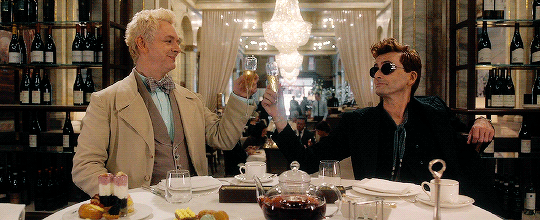
51 notes
·
View notes
Text
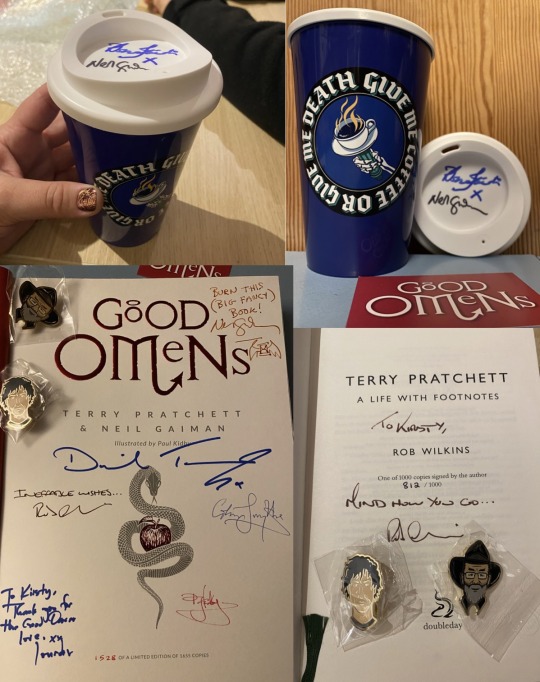
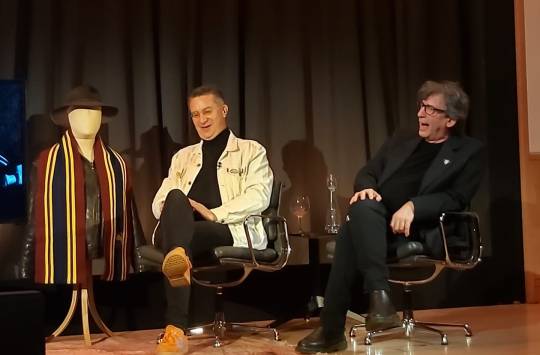
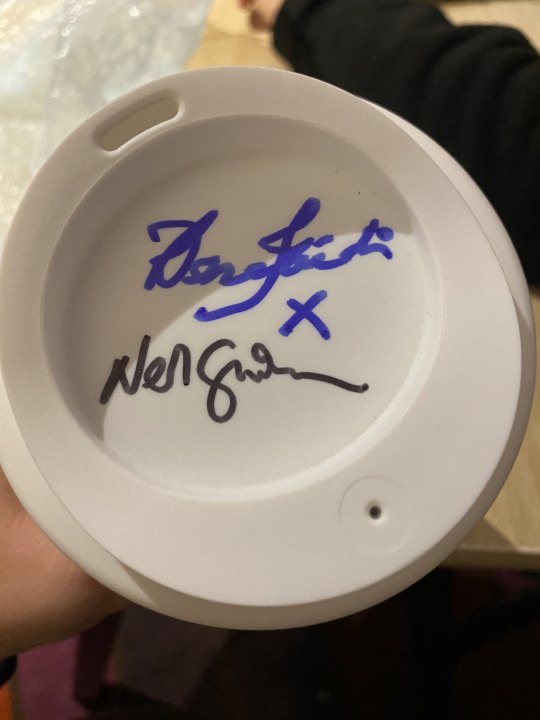
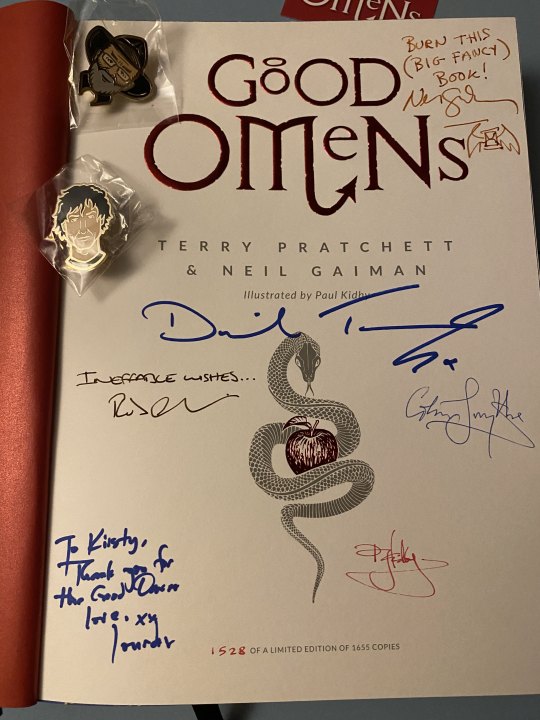
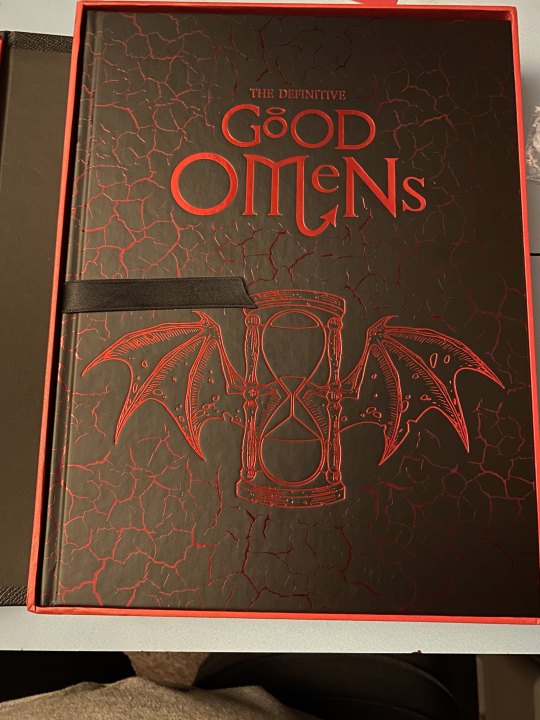
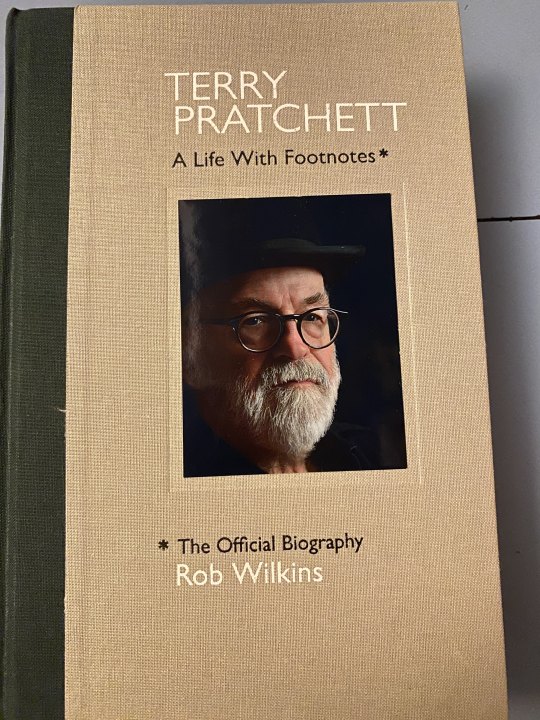
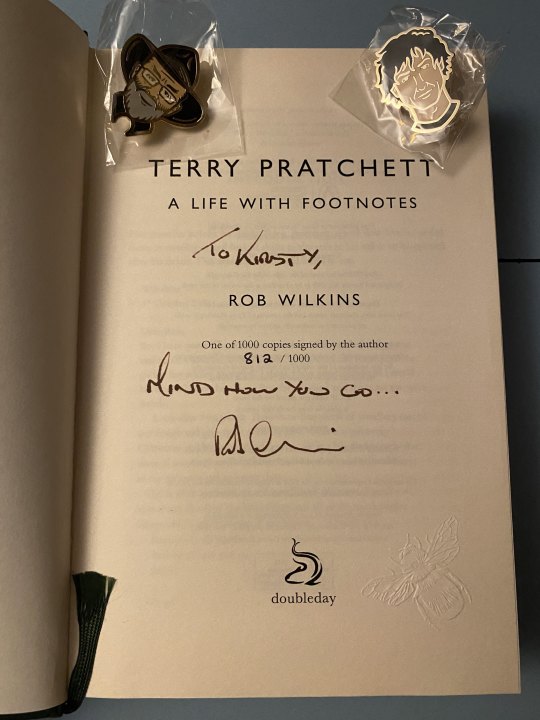
"Just Neil Gaiman being wholesome again" but also Rob Wilkins being extra wholesome too! On Tuesday evening I went to this talk https://living-knowledge-network.co.uk/library/the-worlds-of-terry-pratchett By Rob Wilkins and Neil Gaiman.
Neil was co-author of "Good Omens" with Sir Terry Pratchett, and they collaborrated on many other books together here and there, just not sharing co-author status too - read this article for more info: http://www.elizabethcallaway.net/good-omens-stylometry?fbclid=IwAR2hVnd8aTYFBZqphk8SzYt8j1NucBl5mUxbDscF3kljQ9Bpuq2leUW2S6I Confirmed by Neil yet again on Tuesday.
Rob Wilkins was Terry's PA, and now manages his estate, as his representative. He also wrote "A life in footnotes" - the official biography of Terry.
On Tuesday evening, I arrived at the British Library very early, and was guided up to the Piggot Theatre lobby to wait by a security person, so I was there before anyone else, including Rob. All the staff were absolutely lovely. When they noticed there weren't any gaps for wheelchair spaces in the audotorium, facilities engineers were summoned and made short work of unbolting a set of 3 seats to make a wheelchair space for myself and another wheelchair user who turned up later.
Then Rob turned up, carrying a mannequin, Terry's leather jacket, scarf, hat, and other stuff.
Now the email we recieved before the event said that Neil wouldn't have time to do any signings that evening, although they didn't mention Rob, so I asked him if he might be able to sign my copy of "a life in footnotes".
He happily said yes, and once he'd sorted his things out, he came back out to chat to me for a while and OMG he was the loveliest person EVER!
I gave him a print I'd signed of my ink portrait of the Bentley, and some stickers of my other Bentley illustrations, and he said "WAIT! I have presents for you too! I'll be right back!" Then rushed off to the green room.
(Below are the ink portrait, then I gave him small stickers of the "this is fine" flaming Bentley - which I was also wearing on my t-shirt that day - and my most recent digital portrait of Crowley and the Bentley - and yes it is all hand drawn, not a photo manipulation, feel free to zoom in. A couple of years separate these 3 drawings and I'd been working hard on learning photorealism.)
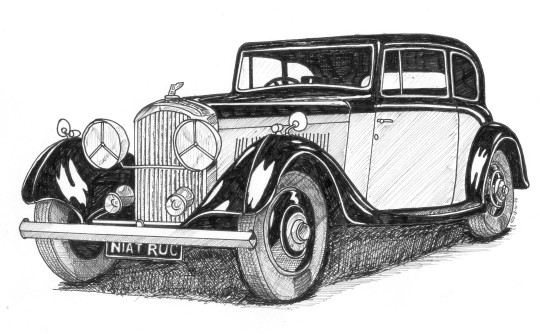
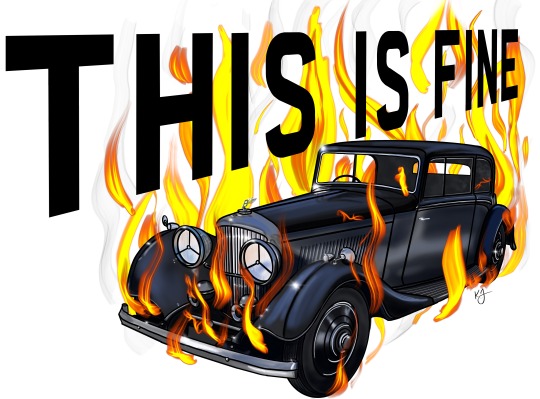
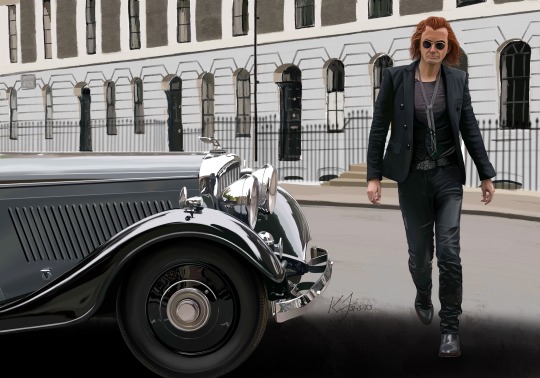
He came back and gave me Terry and Neil badges, which he explained you only get if you meet them in person. I had met Terry (and incidentally Rob as well) years ago at a book signing, plus I met Neil, albeit briefly, on Tuesday as he came through the lobby and said hello.
He was happy to chat and especially about cars, which he also loves. He confirmed that I was 100% correct about the "2 whole cars and a cab for CGI" between seasons 1 and 2, and that the interior colour change is nothing to do with plot it legitimately is just continuity errors if they forgot to cover the new Bentley's new seats with covers matching the old Bentley's orange ones. (The cab only also has orange leather seats).
When I told him about this year's RREC (Rolls Royce Enthusiast's Club - also for Bentleys) Christmas card design, he was delighted, and asked to take a photo of the image I had of one on my phone because he wants to order some as well.
I showed him my re-usable coffee cup from "give me coffee or give me death" which we were given on the set tour, and which I had Sir Derek Jacobi sign at a comic con the other week. Rob thought that was wonderful, and then did something extra sweet...
He asked me "if you're ok trusting me with this for a little while, would you like me to sneak it back to the green room to ask Neil to sign it for you as well? Then I'll come and find you afterwards to give it back again."
HELL YES! I couldn't believe it! I hadn't wanted to ask because we'd been told that Neil wouldn't be signing things due to lack of time, so for Rob to spontaneously make the offer was not something I was expecting. He did also take my Occult Edition of Good Omens to ask if Neil would sign that as well.
I didn't fully expect that he would, and was prepared for him to come back later and say "sorry he was too busy", and that would have been fine, but no: Neil DID sign them both!
Neil writing "burn this (big fancy) book!" was a spin on how Terry used to sign copies of Good Omens: "burn this book" - which is actually embossed on the rear cover of this edition.
Later, Rob also signed it for me, as did Colin Smythe, who was Terry's publisher and lifelong friend.
We were sitting at the front, only about 7 or 8 feet from Neil, the talk was wonderful, we laughed, we cried a little, and Terry was with us in the form of the mannequin with his jacket, scarf, and hat (which are also on set of Good Omens at all times while filming, and also even during rehersals/table reads - so he's always present.)
Rob is honestly so bloody wholesome, he was hugging a lot of people, and ever so sweet, taking time to chat to other people as the venue filled up, and stayed behind to sign things and talk to other folks as well.
I also got to chat to Dr Pat Harkin and Dr Jan Clarke, who were the researchers who spent months of hard work tracking down Terry's lost short stories in the national archives in Boston Spa, which were released in a compliation book "A stroke of the pen." If I'd known that they'd be there as well, I'd have taken that book and asked them to sign it too. They were in the audience and sitting next to us with Colin Smythe. I was truly surrounded by Pratchett royalty, and everyone, without exception, was SO friendly and lovely.
I had done two prints of the Bentley drawing and stickers, for Rob and for Neil, in case I got chance to give them to them, and when I gave Rob his, I said I had some for Neil as well, and again, he OFFERED to take them to give them to Neil for me.
Although I didn't get chance to thank Neil in person, I wanted to reach out to let him know I was very grateful for his kindness as well, so sent him a message via his "ask" channel, although not with an expectaction of reply - just for him to see privately and know that I was appreciative. But he chose to actually publish it as a public reply, which was lovely of him. I hadn't wanted to thank him publicly just in case he didn't want others to know that he had signed some items after all. I'd been expecting to have to wait until he did a proper public appearance with signing at a comic con or something - although with him living in the USA, not the UK, I may have had to wait a long time.
So I guess the answer is to getting an autograph - turn up 2 hours early, and be very VERY nice and polite to Rob Wilkins 😅 (but also don't expect results - I didn't, it just sort of happened).
33 notes
·
View notes
Text
Ranking Inside No. 9 Christmas Episodes
I ranked the horror episodes for Halloween, now I'm giving the Christmas ones some attention. It's also been a while since I posted any Inside No. 9 content, so it's nice to get back into it
The Bones of Saint Nicholas
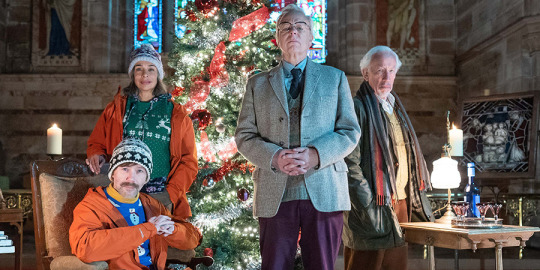
Make no mistake, just because this episode's at the bottom of my list doesn't mean I disliked it. In fact, I think this one is criminally underrated! Stunning setting, an intimate and talented cast, and a jaw-dropping twist: this episode is truly everything you could want in an Inside No. 9 episode!
Love's Great Adventure
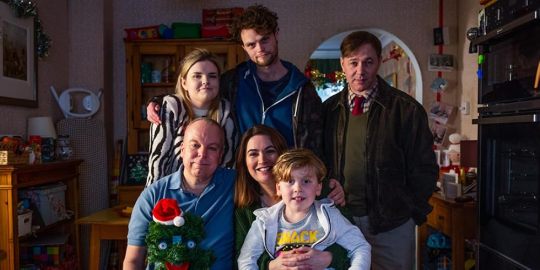
You guys know I'll talk for ages about this one whenever I get the chance!
It's a fresh take on the usual Inside No. 9 episode and it paid off in spades. The entire cast is equally amazing, but Bobby Schofield and Steve Pemberton were standouts for me. The themes of family and male friendship really tugged at my heartstrings, and I wish more people talked about this simplistic, yet utterly beautiful, episode
The Devil Of Christmas
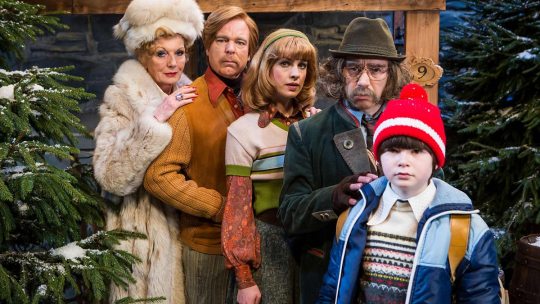
I had a very simple rule for anthological series like Inside No. 9 and Black Mirror: one 5-star review per season. This episode made me break that
They managed to perfectly capture that "cheesy 70s horror film" look and feel, while simultaneously keeping us engrossed in the story. Not to mention the use of the director's narration adding some great moments of intrigue and humour
And that twist... wow! Easily one of the best in the whole show
Fun fact, both this list and my Halloween one include an episode starring Derek Jacobi taking first place!
#reece shearsmith#steve pemberton#inside no 9#inside number 9#inside number nine#in9#the bones of saint nicholas#the bones of st nicholas#love's great adventure#the devil of christmas
23 notes
·
View notes
Text
Spoiler alert of Good Omens season 2
I'll try to explain the feeling of "this is a fanfic I've read before" by that I'll take in consideration not only "the coffee theory" but also the re-cast of actresses in other roles and the references to Doctor Who.
Enjoy my madness, and re watch season 2 so Amazon gives us season 3, please.
First:
We have the interesting choice of Derek Jacobi as Metatron and my personal hate/dislike/discomfort towards Metatron that I carry with me from the Supernatural Fandom and the discorporate scene from season 1.


I said interesting choice of Derek Jacobi as Metatron, because he was the proffesor Yana in Doctor Who during the season with Martha Jones as a companion, but you probably remember better the plot of proffesor Yana being The Master WITH NO MEMORIES OF BEING THE MASTER. (I'm chill, I'll take a deep breath)

The parallels with the amnesia plot and someone being better person with no memories between Jim/Gabriel and Yana/TheMaster are quite remarkable, but I want to point out that Metatron is one of the closest angels to God and we haven't heard from God this season unless we talk about the flashback from the Job story, so it's probable that Metatron is the real one in charge of Heaven since Armageddon't happened in season 1.
One of Metatron powers as we were told at the end of the season 2 is that he can rewrite the book of life. Archangel Michael wanted to use that power to erase the existence of those who hide Gabriel from heaven, but Metatron refused that option and send them to heaven, proving that he has more authority than the archangel Michael or Uriel.
I wanted to point out that to explain my next point, witch is one I have no real proof of... Anyway, I think Metatron is messing with reality and that's why we all get that feeling of "this is a fanfic I've read before". Why do I say that? When Jim/Gabriel was "putting in order" the books in the book shop he read the first sentence of the original material the show is based on, the book Good Omens write by Terry Pratchett and Neil Gaiman, that proves that the book exist in that reality and if a being other than God herself can be conscious about the fact of being in a novel or can manipulate the reality to turn the story of season one into a novel and write a fanfic after the end of that story... That character is Metatron.
I'm not sure of why he would have done that, but that will lead us to may next point.
The actresses who play completely different characters this season.
First we have our dearest Madame Tracy, Miranda Richardson, playing the demon Shax who is Crowley's substitute in his hell of a job. (sorry about that pun)
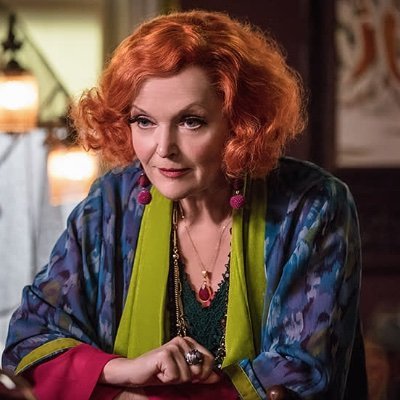
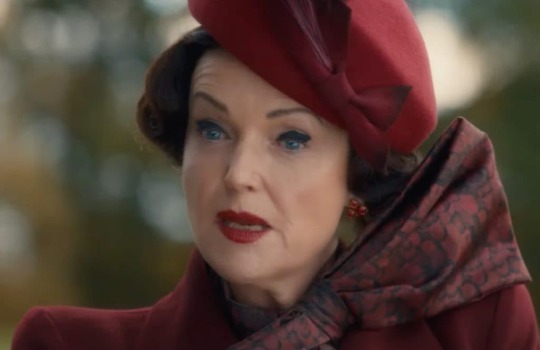
After that we have Nina and Maggie.
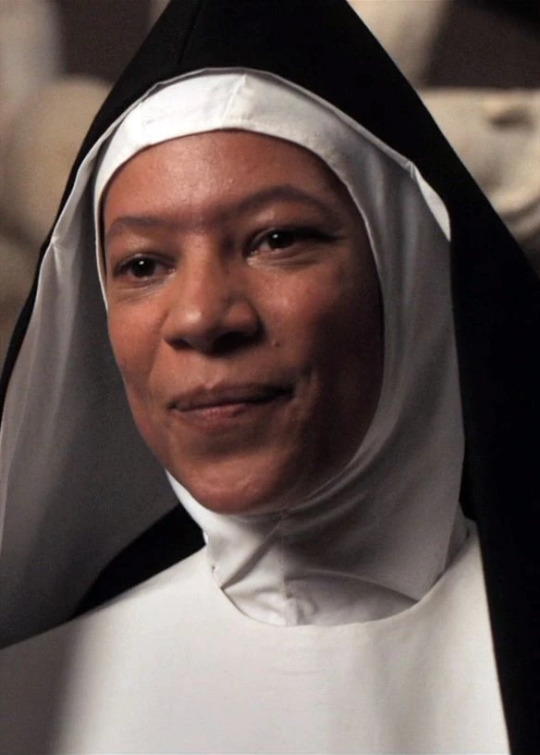
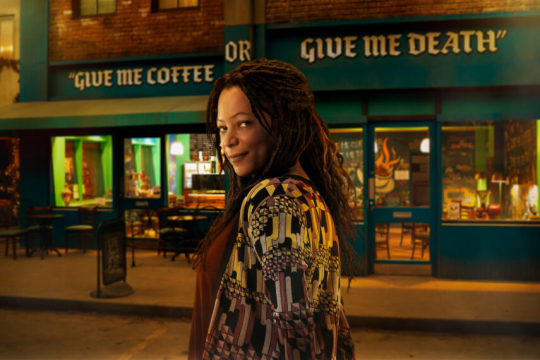
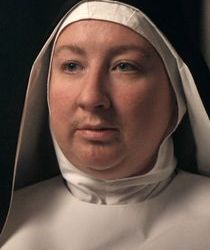
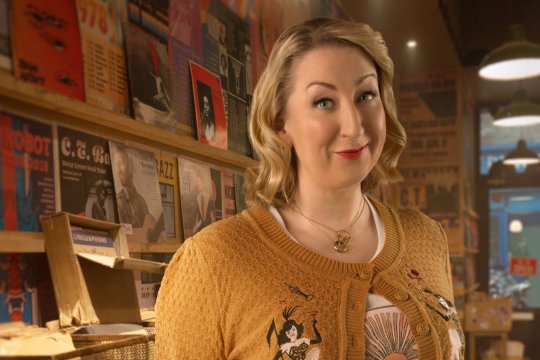
This is where it gets interesting. Because the actresses are playing characters with their real names and no last names (sorry if I'm wrong, I'll correct this if I'm wrong), but in season 1 Maggie played Sister Theresa Garrulous and Nina played Sister Mary Loquacious, both of them involved in the mistake that lead to Armageddon't being the both of them the ones (along with Crowley) that messed up the switch of the babies.
So... I think Metatron is mad about the events of the season one (the whole Great Plan thing), he could have tried to talk with God but she was enjoying the turn of events that Crowley and Aziraphale caused and ignore the rest of the children (a.k.a the angels) which lead the archangels to try again (I think Metatron was the master mind behind "Michael's plan" because archangel Michael has proven to be a bit incompetent this season only cares for the title of boss but not really good at it) and they vote about it, but the Bureaucracy Husbands were already a thing and make Armageddon't 2 even before the actual Armageddon could start to be put on action.
That is why I think the "present" of the story started with that fanfic/fictional-story feeling of fiction with a "nice morning" and Aziraphale being an angel towards the humans around him (which is suspicious that said human is Maggie) and finally the arrive of nude Gabriel as a plot start point.
I point this out because in season one God narrated things and all felt more normal, like the world was boring, ordinary nothing really extraordinary if demons or angels or the antichrist weren't involved (which was the reason Newton Pulsifer could located the unusual weather Taddfield had the prior eleven years), but this season the ambientation of the street was different (or I felt that way) like it was nicer less mundane or normal or ordinary...
We know angels don't completely get the human behavior, that's why I know I saw humans doing human things and having human reactions (when everyone was filming naked amnesiac Gabriel or the owners of the shops) but things like the ambientation of the street or Maggie and Nina's reactions towards magic (in season 1 Shadwell, Madame Tracy, Anathema, the Them or Newton had more realistic reactions when miracles were perform around them) or the demons surrounding the library (my first thought was "this smells like a Halloween Disney movie"), all those things felt a bit like if someone was writing something with not really idea of how the world work.
Finally, all this lead us to "the coffee theory" which is possible and if Metatron was writing the world we saw taking references from other things that already existed, would explain why that feeling of "fanfic" and... AND why he walked into the human world to interact with Aziraphale, the humans and the world instead of appear only as a gigantic head in the middle of the book shop. He needed to be there or at least he wanted to be there and was confident enough about his plan to go down to earth.
Angels were all about bureaucracy, they only showed their faces on earth if there is something important to do or say, but in season 1 Metatron didn't go down or interact, except when Aziraphale called him. And I think that plus the mega-powerful miracle that Aziraphale+Crowley casted over Jim/Gabriel, those two things were the reasons why Metatron decided that he needed Aziraphale by his side. (we can't forget this is a you are on my side or you are against me, kind of situation) And Metatron did something to Aziraphale which lead to the divorce kiss scene and our broken hearts.
That's all I have.
Thanks for reading.
And please, feel free to add or correct me if I'm wrong about something.
#good omens theory#good omens spoilers#good omens 2#innefable husbands#innefable bureaucracy#metatron#thecoffetheory#this is my copping mechanism to deal with my broken heart
18 notes
·
View notes
Note
omg i just saw that you have been reading the “brother cadfael” series. i grew up reading those and have an immense fondness for them. i love cadfael’s no-nonsense approach to everything, including religion, but all of the other monks and their various foibles and failings are so fun too. have you checked out the miniseries starring derek jacobi? any thoughts you’d like to share about the series? :D
I LOVE them!! And I haven't watched the miniseries, but I did just find out most (all?) of the episodes have been uploaded to YouTube, so I was thinking about giving it a go. I just haven't been watching much lately because, well, I spent the last three and a half months or so doing nothing but staring vacantly at my tablet, and now that I'm feeling better, I'm writing and reading and actually getting variety in my day.
I'm actually an atheist, and something I really love about the series is that Cadfael is more worldly than a lot of the monks, but that's never presented as him being automatically superior or cleverer than them, and though I don't agree with his beliefs as a non-believer myself, I think his faith is depicted in a really lovely, gentle way that brings even a heathen like myself some comfort. I actually read a couple of these books while the results for the 2020 election were still being tallied, because it was the most interminable week of my life and I was incredibly on edge and anxious, and I decided to sit down with one of these and see if I could focus enough to read, and it actually brought me out of that nasty headspace for a while. They're my comfort reads, and I've been stretching the series out for a few years now and finally am down to the very last one, which makes me sad, but I have re-reads to look forward to. I love that Cadfael is a little bit of a cheeky bitch but immensely compassionate. I love that these are set during an incredibly turbulent period of history and yet they're infused with such love and hope for humanity, without glossing over how ugly it can be.
I actually read 'The Heaven Tree' trilogy under her real name first, and that put me onto this series. I love the Middle Ages, I love historical mysteries, and I loved 'The Heaven Tree', so when I saw that the same author had written a historical mystery series set during the Anarchy, all the pleasure systems in my brain lit up like a casino machine hitting a jackpot. And I wasn't disappointed; I turn to these every time I want something a bit cosy, when I'm too exhausted by the world to tackle anything really meaty, but don't want to shut off my brain completely. It's full of some lovely prose, and people, and I've had a lot of fun with the series. It gives me a space not unlike Discworld does, where I can go when I'm feeling like biting the human race and know that I can find some reassurances that humans can be really stupid, and terrible, but it's not yet 'blow up the planet with everyone on it' time yet.
2 notes
·
View notes
Text
THE BUMBLING FOOL -
an essay/rant
(contains spoilers for The Wizard of Oz and Doctor Who episodes “Utopia”(s3/ep11) and “Sound of the drums” (s3/ep12))
To begin, I present to you some context….
So, recently I saw a post by @monica00 who posted an excerpt from the Master’s diary. The “MASTER OF ALL I SURVEY” is composed of several diary entries written by Simm!Master. In one of them, Day 42, he mentions carving the faces of several of his regenerations (Delgado, Ainley, himself and the “Wizard of Oz”) into Mount Rushmore. This led me to ponder who he’s referring to when talking about the wizard of Oz.
So, after thinking a bit, I finally figured out that he was talking about the Master as portrayed by Sir Derek Jacobi / the War Master. And that led me to composing this handy (and probably not that well written) list? Analysis? Essay? About the parallels between the character of “The Wizard of Oz” and Professor Yana/the Master.
Note: My information on the wizard of Oz is partly taken from deep crevices of my brain and the “Wizard of Oz” wiki, so I might be mixing up several portrayals of the character. Also, this is my personal interpretation, so yeah…
Enjoy, I guess…
This rant is dedicated to my current Doctor Who obsession and of course to @roxannepolice, my motivation for writing/ actually publishing this. Many thanks to you for feeding my thoschei obsession with your content and (ask game answers) and exsisting.
After Dorothy arrives in Oz via hurricane, she desperately “wishes” to get back home to Kansas. The Good Witch informs her about the approaching threat of the Wicked Witch (who is going to chase her down and try to kill her because she crushed her sister, the wicked witch of the east, with her house and stole her magical shoes. Which are all pretty valid arguments If you ask me.). Glinda says that in order to go home she should ask the “Wonderful Wizard of Oz” for help. Dorothy (having just killed someone) and her dog, Toto, go on their merry way, following the yellow brick road to the Emerald City.
On the way there she meets several other characters who also have a deep wish they want fulfilled by the wizard. There is the Scarecrow who wants to have a brain, a tin man who wants a heart and a Lion who wants courage.
After some tribulations they are finally able to have an audience with the Wizard, who appears as a giant floating head – in return for fulfilling their wishes the Wizard demands the Wicked Witch`s broomstick.
(Character who appears as a giant floating head - Just like, oh, I don’t know a certain other character played by Derek Jacobi, cough cough the Metatron, cough, cough)
They defeat the Wicked Witch and return with the broomstick; he tells them to come back tomorrow – but Toto pulls back a curtain and the group discover that “The Great and Powerful Wizard” is just a guy operating a projector machine.
He is projecting an image of himself, the image of a giant powerful magician capable of doing almost anything.
When confronted with the fact that he is a humbug, he admits that he is but says that he’s – still a good man at heart.
Although he promised to grant their wishes, he merely gives them “tokens” of the things they actually wanted. For example, a heart shaped clock for the metal man and a diploma for the Scarecrow.
The wizard finally decides to go home to Kansas, the same way he got there - in a hot-air balloon. He also offers to take Dorothy with him, fulfilling her wish. This ultimately doesn’t work as Toto runs off and Dorothy goes after him. Just before departing he makes Dorothy’s companions the rulers of Oz – effectively dumping all responsibility on them.
In the end Dorothy manages to get back home with her magical shoes.
However (depending on the version) Dorothy has fulfilled her wish on her own, none of her other friends have actually gotten their wish granted.
------------------------------------------------------------------------
Let’s take a look at the parallels between Yana and Oz.
“Utopia”, is the only episode Yana and Jacobi!Master appear in, it takes place on a desolate planet called Malcassario at “the end of the universe”, a time not even the timelords have reached.
Ten, Martha and Captain Jack (don’t ask me why he’s here just roll with it) go to explore and find nest-like structures carved into stone. Remnants of a civilisation that used to live here long ago. They get wrapped up in a hunt, a (human) man is being chased by the Futurekind, a tribe of savage hunters with sharp teeth. They join him in running to the only safe place around – a silo.
Later a guard confirms that this is the place to go if you want to go to Utopia – the ultimate salvation from the end of the universe and the infinite darkness that surrounds them.
They later find out that a scatterbrained scientist called Professor Yana (and in extension his malmoothian assistant, Chantho) are supposed to make the rocket that’s supposed to take them to Utopia (a call which “came from across the stars over and over again. Come to Utopia.”), fly.
The thing is, they have no clue how to do that – not that they are not scientists – but they do not have enough energy to lift off.
The surviving humans yearn “to preserve [themselves], to find a way of surviving beyond the collapse of reality itself.” They have come so far, survived all these great hardships, lost their friends, family, lives, everything.
They presumably see Yana as a saviour, the one who will lead them to Utopia “where the sky is made of diamonds”. Yana is even willing to sacrifice himself for them, staying behind as the rocket takes off.
Every single human left in existence is relying on them to survive. They all want something from him. He is their own personal version of “The Great and Powerful Wizard of Oz”, able to grant their deepest wishes/ they are projecting their wishes and hopes on him.
They aren’t scared that the myth of Utopia isn’t true but they fear that they won’t survive long enough to reach it.
(As I’m writing this I kind of realize that the Doctor (or the Master) can relate to all these humans, just like them they have lost everything, their home plane and their friend. But the doctor still hasn’t given up hope he’s still running away, desperately clinging to any human who wants to travel with him and secretly wishing that the last words of the Face of Boe “Know this, timelord. You Are Not Alone.”, are true.)
There are also some parallels between Martha and Chantho. In a private conversation while the doctor helps Yana power the rocket, Chantho reveals that she has known the Professor for a long time and that she adores him but does not think he notices. This kind of parallels Martha’s relationship with the doctor, she’s also in love with him but knows that this love will never be reciprocated, she’s not even sure if he’s noticed it.
But, ultimately the loyal Chantho gets electrocuted by the Master after he has recovered his memories – blaming her for not noticing or asking about the watch (which contains his true identity) sooner. She falls to the floor – seemingly dead – but manages to shoot him in her last breath.
Her wish for love has not been fulfilled.
Let’s get back to the humans for a second: as soon as the Master becomes himself again, he lowers the protective measures against the Futurekind, locks the Doctor and Jack in the control room and removes a circuit board from the navigational system to Utopia. The rocket’s flight path is interrupted in the fate of the humans is left unclear.
(At least until Sound of the Drums but isn’t the toclafane’s existence, bound to a singular metal dome a never-ending thirst for blood ingrained deep within you, a fate worse than death? Are they even human?)
The Doctor’s next, we will ignore Jack because he doesn’t really fit into the grand scheme and he’s literally just forcing himself into the plot.
Throughout the whole of new who up to this point it has been established that the Doctor is completely and utterly alone in the universe. In the episode “New Earth” (s2/ep1) a Novice teases the last words of the Face of Boe which will only be given to someone like him “a wanderer. To the man without a home. The lonely God.” In Gridlock (s3/ep3) he tells Martha about the time war, “There was a war. A Time War. The last great Time War. [..] They lost. Everyone lost. They’re all gone now, my family, my friends, even that sky.”.
Like I already mentioned, The Doctor is constantly craving companionship – he has throughout all his lives, especially in the new series he wants to alleviate the pain of the time war, the crippling loneliness that claws at him every second of every day, no matter how much he tries to escape it.
When Yana hears of a scientist, “a doctor of everything”, he is immediately overjoyed, he rushes to greet the doctor and whisks him away to his laboratory. He quickly introduces him to all his equipment but despite the doctor’s massive intellect, he can’t even think of any solution. Yana is obviously sad but apologizes, saying that there’s been “so little help”. To me this immediate joy and desire to meet the doctor is also partly the masters. He feels lonely as well – as reflected by Yana’s own feelings - “Never could keep time. Always late, always lost. […] Time and time and time again. Always running out on me. […] Oh, it's only an old relic. Like me.”
Yana desires rest – eventually his own wish gets fulfilled, just like Oz escaping from Oz and going back to Kansas.
Generally, the Chameleon Arch creates a personification of some aspects of the user`s personality, for the Doctor his “worse traits” get amplified, for the Master his “better traits” are amplified, he’s willing to sacrifice himself just to save someone he doesn’t know and is kind to everyone he comes across.
When the Doctor sees Yana’s inventions, he’s starstruck. He’s finally found someone like him – an equal. “Oh, it's easy coming in at the end, but you're stellar. This is, this is magnificent. And I don't often say that because, well, because of me.” He recognizes how underappreciated Yana is in this time – “If you'd been born in a different time, you'd be revered. I mean it. Throughout the galaxies.”
They briefly take a break to talk about the constant never-ending drumming Yana hears in his head and this iconic look™ happens.
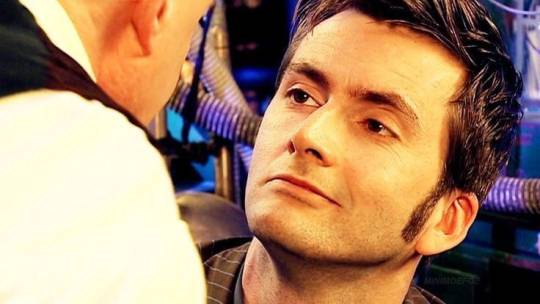
When Yana opens the watch and turns back into the Master, ten rushes to get to him, he begs him to open the door, to let him in “I'm begging you. Everything's changed! It's only the two of us! We're the only ones left! Just let me in!” But, the Master, the only other person like him in the entirety of the universe, escapes with his own Tardis.
The Face of Boe’s prophecy and the Doctor’s wish have come true.
He’s not alone anymore.
But it doesn’t last as the Doctor (not even two episode later) has to watch as the Master dies in his arms refusing to regenerate because it would mean having to spend the rest of his lives imprisoned wit” him.
He’s alone again.
Professor Yana just like the Wizard has a lot of responsibility. They are both good men at heart. But are still not able to fulfil the wishes of the people relying on them.
But at the same time, they are both humbugs.
A humbug, as defined by Miriam Webster, is “a false or deceiving person or thing, a fraud”. Both Oz and Yana are humbugs in both meanings of the word. They are both “false people” with the Wizard being merely a projection controlled by Oz and Yana literally being a “false person”, a fake identity created by the Chameleon arch.
They are both good men at heart – they want to or at least try to fulfil the wishes brought before them – but they both deceive their “subjects” – so they’re more morally grey. Yana tries his hardest to build a rocket and a system to power it made out of food scraps. He’s using technology the Doctor has never even heard of. Yana may be a good person, but ultimately the Master is not.
In the end, Jack, Martha and the doctor barely manage to escape with Jack’s vortex manipulator – his red sparkly shoes.
And that’s it. If you’ve managed to make it this far, you receive a “virtual” participation trophy, congrats. 😊
Have a good day and....
Until next time (maybe?)
#doctor who#Kansas = Gallifrey confirmed???#you know it's serious when i pull out the dictionary defintions#this is what you get when you have watched Utopia too many times#a win win#I would say#if someone has a better title#hit me up#Beyond excited for rogue encounters
10 notes
·
View notes
Text
GO Book: Metatron is a stick in the arse angel who needs to be taught that the ineffable plan is also not known by him and questioning is good actually.
Me: okay cool I can work with that, boy has room for character devellopment
Dogma: Metatron is Her Voice and he's a snarker with a heart of gold, also a diva
Me: love it
His dark material: we're gonna actually dive into the Enoch lore, but make him a sleazy, dick driven power hungry asshole
Me:... Well at least you... Did your... homework on the lore *cries a little
Spn: *introduces Metatron as a recluse guy amongst books*
Me: *excited* oh you can do so much with this!
Spn: he's a manipulative, little desk worker coward who wants more power
Me: they massacred my boy
GO Season 1: we're casting Derek Jacobi
Me: okay, bold choice but I can't wait for extra scenes
Go S1: Actually we're giving his book role to Gabriel whom we made up and relegating Metatron to that one answering machine scene
Me:.. You what?!
GoS2: we're doing something with Gabriel that people wouldn't have wanted to see with Derek Jacobi anyway now, so good thing we gave metatron's parts to Jon hamm... but we're bringing metatron back in the last episode and he's important now. But people will hate him because he's probably a master manipulator because we're not giving AC a happy ending on the cliffhanger for S3 and people saw supernatural metatron and doctor who Jacobi Master.
Me: why are are they doing my boy so dirty... You know Derek Jacobi isn't just the master, right? He's also shagging Ian McKellen in Vicious. He wouldn't tear a gay couple apart. Give me a metatron with character substance Neil! Please don't copy your homework from the kid that's milking the dead "Monster of the week" horse.
#Good omens spoiler#Metatron#Why do so many media things insist on making him hateable#Also he isn't even that bad yet#People are just oh he was mean as the master and Supernatural said metatron is bad#Imagine if they had just made Jon hamm metatron and stuck with the book instead of making Gabriel up for the show.
1 note
·
View note
Text
What does Aziraphale know and when does he know it? Part 2, The Chinwag
Prologue and Part 1, for those who need them.
The chinwag is written and shot in two timeframes: as it's happening, and as Aziraphale retells it to Crowley. That's a fair wodge of extra production expense, compared to just having Aziraphale retell the story. There's got to be a reason for it (beyond additional Derek Jacobi, which is never bad).
I think the reason is so that we-the-viewers can check the congruence between actual events and Aziraphale's retelling, also between Aziraphale's emotional reactions to the Metatron and the emotions he pours out to Crowley. (Remember, Aziraphale is a lying liar who lies!) Also, as some meta-ists have already pointed out, to leave the possibility open that we are not getting the whole story in either frame -- there's likely some interaction that we aren't shown and that Aziraphale doesn't tell Crowley about.
But why wouldn't Aziraphale tell Crowley everything? Hold that thought (though if you've read through my metas, you already know my answer).
The chronology of the chinwag is very tangled in-show (we first see the very end of it!) so I'm going to disentangle it here, as best I can.
Aziraphale tells Crowley, "[The Metatron] said that Gabriel obviously hadn't worked out... and he asked who I thought should take over in Heaven..." Then we cut to the actual chinwag. Aziraphale looks a bit how-is-this-my-problem-exactly, and gives the obvious bureaucratic corporate yes-person (well, yes-angel) answer: Michael.
And the Metatron calls him silly for it. The Metatron has just insulted Gabriel, Michael, and Aziraphale in practically the same breath; if Aziraphale had had any doubts about contempt being fundamental to the Metatron's personality, they've been blown away now.
The Metatron: "... there's only one candidate who makes even the slightest bit of sense." Aziraphale's reaction shot: polite interest in his face, but his hands appear clasped together under the table -- he's stressed and he's hiding things. "And that's you."
And we don't get Aziraphale's actual reaction to this -- we cut back to Aziraphale telling Crowley. I know what I think Aziraphale's actual reaction, and how he expressed it, were -- and I don't think for an instant they were the same -- but by all means consider for yourself. The show wants you to. Also consider whether either of those is the same as the excitement he projects toward Crowley. My cards on the table, and a sneak peek of the next post in this series: I don't think so. I think Aziraphale retelling this story is Aziraphalean kayfabe. The Metatron wants and expects him to be excited, so he's acting excited.
We then cut back to the Metatron's actual words: "Well, yes, you're a leader, you're honest, you don't just tell people what they want to hear; it's why Gabriel came to you in the first place, I imagine."
There is not one word of this that is not bullshit. Starting from the end, Aziraphale knows why Jimbriel came to him, because he asked and the utterly guileless Jimbriel told him. It had nothing to do with leadership or honesty; it was because Jimbriel had a strong, if vague, impression that Aziraphale was the one being who could and would improve Jimbriel's situation. (Other metas from other meta-ists discuss why Jimbriel might feel this way.) The rest of the Metatron's line is manipulative generic corporate-style flattery having zero intersection with the phalanx-refusing, frequently-deceitful, go-along-to-get-along angel we all know and love.
So is Aziraphale buying the Metatron's love-bombing? I mean, it's wholly plausible that an angel would buy it, just out of sheer emotional desperation; Heaven's angels -- those who even remain after the Great War and the mass Fall -- are pitifully love- and approval-starved. Aziraphale himself has barely gotten a kind word from Heaven in his entire existence, and he's had plenty of reprimands. Gabriel didn't get a single gift in six thousand years. Lonely, obliging, bottom-of-the-hierarchy Muriel practically plotzes at the least slightest hint of approval from anyone ever.
There's only one angel on Earth or in Heaven who knows genuine, sustained love and support, though, now that Gabriel is gone -- and it's Aziraphale. I look at Aziraphale's face after the Metatron drops that love bomb, and I see no hint of joy or warmth or Muriel-like gratitude. He's not buying it. Aziraphale knows what love is, and this ain't it. (Crowley rescues Aziraphale once again, and he's not even there! I love this.)
What Aziraphale knows at this point:
The Metatron wants him back in Heaven.
Given the Metatron's habitual contempt for everyone around him, and given the blatant lies with which he expresses respect for Aziraphale, the Metatron must be lying about that respect. So whatever his reasons for wanting Aziraphale in Heaven, they're not his stated reasons about Aziraphale being suited to the job.
The Metatron is really buttering him up! "Second-in-command after me" is a pretty solid bribe! A lot bigger than a coffee! And the Metatron doesn't butter anybody else up! So the Metatron has clearly (and likely correctly) determined that ordering Aziraphale around doesn't work -- Aziraphale has a history of defying blatant orders, both openly and by working-to-rule. (The Metatron may or may not know the full details of the Arrangement, but of course it is another example.)
The Metatron is neither omniscient nor infallible. He doesn't know why Jimbriel went to Aziraphale. He doesn't know what line of patter will serve as a suitable love bomb. He can likely be fooled.
What Aziraphale likely wants to know at this point:
What. The fuck. Does the fucking Metatron. Actually want from him.
What. The fuck. Is the fucking Metatron. Actually up to. Because the Metatron has gone a long way out of his way -- en-corporating, coming to Earth, grabbing a coffee, saving Aziraphale from Michael, holding Muriel in reserve, separating Aziraphale from Crowley, pouring poison into Aziraphale's ear (Hamlet allusion, anyone?) -- to further whatever his aims are.
The Metatron, next: "There are huge plans afoot, enormous projects, and I will need you to run them. You are just the angel for the job."
Aziraphale's face, in the next shot, is still full of worry. That's a partial answer to the questions in his mind, but far from a complete one. So he plays to keep the Metatron talking, hoping that will make things clearer. "I… I don't want to go back to Heaven. Where would I get my coffee?" (He doesn't want coffee on a regular basis. He's a tea drinker! This is a prevarication. There is no trust at this table.)
The Metatron, rather than answering, raises his bribe. "You know, as supreme archangel, you would be able to decide whom to work with. I've been looking back over a number of your previous exploits, and I see that in quite a few of them you formed a de facto partnership with the demon Crowley. Now, if you wanted to work with him again, that might be considered irregular, but it would certainly be within your jurisdiction to restore your friend, Crowley, to full angelic status."
I quoted the whole thing because whew, it's crucial and it's layered.
What Aziraphale now knows:
The Metatron sure doesn't look to be taking no for an answer.
The Metatron knows something -- how much isn't clear, but likely something fairly significant -- about the Ineffable Husbands' shenanigans through the ages. He's been studying them. (Which I find chilling, honestly, but I'm a privacy wonk so I would.)
The Metatron knows Aziraphale and Crowley are friends, important to one another; he up and said so.
The Metatron might not mind if Aziraphale got some of his own back from the other archangels. "Deciding whom to work with" in a corporate bureaucracy often means deciding whom to fire, after all. This, too, might be part of the bribe.
The Metatron is somewhat willing to let Crowley return to Heaven. Only as an angel, though, no more bee!demon. He doesn't seem enthusiastic at the prospect, however, or he'd have offered this tidbit already.
What Aziraphale likely wants to know:
The two questions he still has. They have not been answered.
What. The actual fuck. Are these plans and projects? Are they real or are they get-Aziraphale-out-of-the-way make-work?
Is the offer for Crowley on the level? (Nothing else has been so far!) Or is the Metatron's raise not bribery, but blackmail?
As for how Aziraphale responds to this: No joy, warmth, or pleasure, none. His eyes shift quickly when the Metatron first says Crowley's name, and if anything he looks even more worried for a moment. And again, we aren't allowed to see Aziraphale's actual reaction to the raised bribe offer.
If I'm Aziraphale, being railroaded into this return to Heaven by this extremely powerful and worrisomely sketchy being, I sure would want my right-hand demon at my, er, right hand. I'm just saying.
The temporally-last chunk of the chinwag is the Metatron bringing this weird unsavory job offer to a corporately-scripted close: "Well, you don't have to answer immediately. Take all the time you need." Aziraphale plays for additional information, again, by echoing Gabriel's stunned reaction, "I don't know what to say." Note that this is not an eager yes, or any kind of yes at all! Not even the possibility of Crowley being an angel again has managed to wring assent out of Aziraphale! He's the actual opposite of all in on this!
But the Metatron refuses to give any additional information, leaving Aziraphale with a lot of unanswered questions. And he gives Aziraphale an explicit direct order, which is decidedly peremptory of him, considering. "Well then, go and tell your friend the good news."
We see Aziraphale respond to this with his very best go-along-to-get-along faces. He then crosses the street toward the bookshop; his back is turned to the Metatron at last, so he can let out a bit more of whatever he's feeling. What does he do? He takes a deep breath, flashes the Metatron one more brief placating smile, physically pulls himself together, and walks stiffly across the street with another pulling-himself-together gasp for breath in the middle.
This is not a joyous angel returning to his right-hand demon with joyous news. This is an angel with a lot of unanswered questions who's worried sick and unable to let down his guard fully.
Notice, by the way, that the Metatron then goes and has his little insultingly condescending interaction with Muriel, and then he turns back toward the bookshop and stands there. Like Furfur's zombies peering into the magic shop in 1941, he's watching Aziraphale and Crowley from a distance through the bookshop windows. Can he read lips? Who knows. But he's watching.
Next up: The Fiasco.
#gos2spoilers#gos2 spoilers#good omens season 2 spoilers#the fucking metatron#aziraphale#the final fifteen minutes#good omens meta#good omens
292 notes
·
View notes
Text
Masterful has me moping about a beautiful scenario where instead of the mutual sui*ide we got, season 10 had Derek Jacobi swoop in, drag Michelle Gomez and John Simm by their ears into his TARDIS's principal's office and give them a good talking to, along the lines of
You ungrateful old brat. Your great-grandfather didn't accept being a cat to survive just so you can kill yourself because the Doctor is no longer as doe eyed and sweet talking as the one I specifically made you cute and strong for and whose photo you still keep next to your bed. Stop laughing at him, it's not like you're much better and I'll get to you in a moment. Doing anything in our power to survive has been one of our few consistent character traits and you of all of us should know that, what with eating people and creating your own witch coven. Or do I have to remind you what being reloomed feels like? [No, dad.] Good. Now, as for you, old lady. Standing with the Doctor when otherwise convenient is perfectly fine, regardless of what your father's amnesia says, so have no worries here. But externalizing it? Bragging about it?! Killing yourself for his sake?! And all that in an interpretably Stockholmy situation? That's something entirely different. The stupid sentimental sod can get ideas and we really can't have that. And don't give her that smug smirk. You're both grounded in this room until you had a good reflection about what I said and apologize to yourselves. Don't get any ideas, the TARDIS won't let you get closer to each other than three feet and even I couldn't kill anyone from a bigger distance with anything here. Otherwise, you have everything you might need and are free to do what you want.
Of course, when a few hours later Jacobi checks in on his future selves, he finds a very confused Gomez in Simm's suit and an even more confused Sacha Dhawan in Gomez's dress. As it turns out, the two earlier regenerations found a stash of some excellent 3098 vintage and after a few glasses thought it would be a great idea if they did a contest of how long they can last without breathing or using their respiratory bypasses. Except they both failed to notice when they started failing to last. Jacobi then kicks out Dhawan and Gomez at the beginnings of their own timelines and, in a nice foil to War Doctor finding hope in meeting Ten and Eleven, stares into the distance as The Sound of Silence starts playing.
#masterful just makes me so happy i get worried looks from train passenger when i start laughing hysteirically#and especially those three have such a good banter also love the way they keep calling their earlier selves dad#except dads are the younger parties#would i also really like a confirmation dhawan comes after missy? yes probably#headcanon and bash on chibs all you want but the argument that he ruins missy's arc is bad on the very level it tries to fix#is reverting to your destructive tendencies after your attempt at being better left you dead in a wood with a conventient memory loss#really all that worse than trying to get your friend back by offering help in finding your home planet and making him a cybermen army#knowing that in his near future you will destroy that same planet and cybermenize the time lords which won't make her happy?#that doesn't make missy's arc better it makes her look like more of cold blooded psychopath and a stupid one at that#also we've been robbed of dhawan in that dress#anyways rant over#masterful#doctor who#the master#dhawan!master#gomez!master#jacobi!master#simm!master#tw: suicide mention#roxanne screams into the void#and rants in the tags
23 notes
·
View notes
Text
Has anyone listened to the War Master Killing Time boxset?

I listened to the first three on my drive up to Utah and then had to stop, which is an exquisitely awful cliffhanger to stop on.
I can't listen to find out how this resolves until the drive home, which is a sweet torture, although I think I've figured out Nyssa's loophole for escaping the horrible predicament her chapter ended on. I have no idea how Jo's going to overcome hers. I'm hoping they team up somehow.
Poor Jo. There's a great scene hearkening back to Delgado!Master's mindfuckery.
POOR NYSSA. I've wanted this story for so long, a proper showdown between her and the Master. My girl has guts, but Derek Jacobi's Master is SO much more evil and dangerous than Ainley's (Which, from Nyssa's perspective, is saying a lot), although he conceals the cruelty behind a kindly, charismatic, almost fatherly persona.
But Jacobi's Master is never a fool. And he is even more cruel.
Tasty, tasty angst.
Also, I need to indulge in some over-the-top fansquee, because I am possibly Sarah Sutton's biggest fan in the western hemisphere.

(Hang onto that smile, Sarah, it's another of those slobby American fans)
...
Look. Katy Manning is a magnificent character actor who's never left the acting profession. She's fun, funny, outrageous, and her only trouble playing Jo after all these years besides the fact her voice has changed (But it doesn't matter for this, as she was playing Jo Jones) is that she has to dial back the camp. Katy, bless her, has all the acting chops and ego she needs to spar with the legendary Sir Derek Jacobi.
Sarah ... doesn't. She's always been self-deprecating in a way I think most of us can relate to. She's an ordinary person working her damnedest to be as good as she can be, but she's not… One of the top tier actors out there, you know? Not everybody has to be.
Sarah was a child actress who played Baby Roo when she was 9 (The only surviving picture is devastatingly cute) Alice in Wonderland on tv when she was 11, and a couple other child roles before she landed her first adult role as Nyssa, when she was 18. She did pretty well, but let's face it, her nervousness as a young actor sometimes manifested in Nyssa being a little stiff — which worked fine for the character.
After she finished her Who contract, like many child actors, Sarah finally discovered REAL LIFE for the first time in her early 20s. She landed only a couple more jobs before she married and had a child, and the 80s were really, really not great for working mums, so goodbye acting career.
That would have been that, if Big Finish hadn't asked her in 1999 to reprise Nyssa in audio. And boy has she been prolific playing the character ever since, so that Nyssa has grown into the nuanced, stubborn, heroic yet flawed character we saw only in flashes on TV.
In the past ten years BF has also given Sarah bit parts, then major guest characters in non-Who series like Dark Shadows. Finally, they wrote a leading role for her in the series Time Slip— I hope it keeps going! — so anyway, even though I haven't been able to keep up with more, it's been lovely watching her get a second chance at the acting career she had to give up.
And so here we are. Sarah has given some tour de force performances in the past decade — notably in Peterloo Massacre, Prisoners of Fate and Dalek Soul, but also way back there in Spare Parts and the "Winter" chapter of the Circular Time anthology.
I wonder what that 18-year-old girl would've thought if she'd bern told that one day she'd be carrying a 70-minute psychological audiodrama, just the two of them, with Sir Derek Fucking Jacobi. Award-winning legendary star of I, Claudius, among many other notable productions, when she and I were children.
It's not really my place, but I'm so, so proud of Sarah. I hope she feels proud of how far she has come. She has worked very hard to get here. And this time, she was bringing it.
#big finish#commentary#nyssa of traken#jo grant#jo jones#the war master#katy manning#sarah sutton#derek jacobi
31 notes
·
View notes
Note
Did you say your favorite DW villain was The Master? What are your thougts on Dhawan in the role? I like the performance but it makes no sense given how Missy's story ended.
The Master is definitely my favorite villain.
I remember being blown away by him during Season Three, both as John Simm and as Derek Jacobi, for how little he appeared. Watching him tear everything apart, getting to see the power of a Timelord turned to madness...and he very nearly won, too. Had he managed to kill Martha before she escaped, Earth would have been doomed. Even refusing to regenerate and letting himself die, just to spite The Doctor and force him to once again be the last of the Timelords. I couldn’t wait to see this awesome madman return.
...and I was subsequently disappointed by his returning episodes. This is a discussion for another day, but “The End of Time” is...overrated. Well, the first half definitely is. Someday, somebody ask me to give my rant about how they bring The Master back in that episode, because what they do is actually unbelievable, and I have a rant about it. T’is quite long. Plus, then he spends most of the episode just acting like Gollum. But I will never not love the whole “Get out of the way,” sequence. Man, it’s the perfect symbol of their relationship. The Doctor and The Master, squabbling away, when the Timelords are the real threat...
Onto Missy. I was never a big fan, I have to be honest. There were moments where I grew invested, but for the most part she annoyed me. “The Witch’s Familiar” is borderline unwatchable to me for this reason. I did scream when she revealed her identity to The Doctor, but...why did she need to change her name? Why was that necessary? Thirteen didn’t do it. Well, that’s Moffat for you. If he was still writing Doctor Who, I bet Thirteen would go by “The Nurse.” That’s the main thing...Michelle Gomez gives a fantastic performance every time. She isn’t the problem...the problem, as I discovered in “The Doctor Falls” when John Simm came back, is...Steven Moffat doesn’t really know how to write The Master. (In my humble opinion.)
That being said, World Enough And Time/The Doctor Falls is still one of the greatest season finales the show has ever had, and thank god John Simm’s return wasn’t spoiled for me ahead of time, because I screamed like a baby when revealed his true identity. (I tend to do that whenever The Master returns, it’s a problem.) For as much she annoyed me, I was able to get behind the development of Missy’s character in Season 10. Michelle and Peter really nailed it, especially with that wistful “But thanks for trying.” The idea of The Master making a genuine attempt to be “good” isn’t a terrible one...the issue is, it was never going to last. Which brings us to Sacha Dhawan.
Right out of the gate, I just want to say that Sacha is now my favorite Master. I am not joking, I didn’t think anyone could dethrone John Simm, but Sacha is just outstanding. Especially after seeing him in Adventure Through Space and Time, and how mild mannered he was in that role. Like...the range on this guy! He absolutely sells The Master in general, but also The Master going through his current crisis. Just...steals the show. Absolutely steals the show. But you’re right, it doesn’t make any sense with how Missy’s story ended - one foot in the door of actually being proactively good.
But that’s the thing about The Master. He’s an iconic villain for this show, and his dynamic with The Doctor has too much legacy for it to ever be truly rewritten in any lasting way. The Master has about as much chance of being redeemed as The Daleks, the only difference is that they’ll constantly tease it with him...but it’s never going to happen. You ever notice how at the end of his episodes, the show goes out of it’s way to very definitely kill him off “for real” this time? And then, the next time he turns up, there’s no explanation given for how he escaped certain death? Yeah, it’s funny...but it does get old. Same as the “one ship survived” excuse every time they blow up all the Daleks.
I honestly felt bad for all of the people rushing to speculate and compose theories about how Sacha’s Master could, potentially, be an incarnation that occurred prior to Missy. I’m sorry to say it, but they’re just not going to make it that complicated. This ain’t the Moffat era anymore. If we’re seeing a new Master, we can assume he followed the last one in regeneration order. We’re not seeing the growth Missy went through because that storyline is over. I mean hell, if we can’t even keep Gallifrey around, don’t expect Missy to get a reference...sorry, Missy fans. It’s just how the cookie crumbles.
12 notes
·
View notes
Text
Dancing with the Stars Season 29 Week 10: Let’s Talk
So I spent some extra time really thinking about how I want to approach talking about this week. There are many parts and I want to address and I wanna do it as thoroughly as I can. So first let me get the trivial things out of the way. Tyra looked amazing. I loved the judges’ entrance. CAI looked incredible too. Bruno looked great. Derek’s suit would’ve looked better if it were a different color. Maybe a darker and cooler color would’ve been better, like a green, blue or purple.
Okay now let me address the elephant in the room. Nelly. So here’s where I stand. He deserves to be in the final as much as anyone else that is there right now. Period. You can dislike it all you want, but he earned his spot. He is not a Skeleton type where he hasn’t improved, can’t dance for shit, talks shit about EVERYONE and expects to be rewarded high scores for terrible dances. From what we have all seen, Nelly seems to be genuinely shocked that he’s being received well and at the fact that he is doing as well as he is. And he’s hasn’t shown a sense of entitlement that Skeleton always had surrounding him. Plus, he minds his business and doesn’t bad mouth the other celebs. So I’m going to fully reject that comparison. It’s asinine.
“But he was the worst dancer left!” Okay. And? Your point? This is not new. We have had plenty of celebs who were not one of the best dancers make it to the finals. Kelly Osbourne made the finals over Aaron Carter and Joanna Krupa. Cristian de la Fuente made it over Mario. Marie Osmond made it over Sabrina Bryan and Jennie Garth. Jerry Rice made it over Lisa Rinna. Bristol Palin and Bill Engvall made it over everyone. Candace and Alek beat out a ton of people. Noah made it in over Nastia. Ginger dumbass (I actually have real issues with this lady) made it in over Wanya. David Ross got second place. Lauren Alaina got in over James van der Beek. And Nelly making it as far as he has should not be shocking. He’s got the biggest name of everyone on the show. He’s not a bad dancer (he’s actually pretty decent and better than most of the people that I just listed). And his journey is the quintessential DWTS journey. The audience loves a person that comes in with no experience, embraces the experience and improves as the weeks go on. So it’s very strange to me that Nelly is garnering this type of reaction because he’s “the worst left”. It’s almost like a lot of fans have never watched this show before. So I have to wonder what is driving this issue with him (I know why and I’m sure you all know too). It’s the same thing that drove (and still drives the uproar) for Jacoby placing higher than Aly back in season 16.
“But what about his sexual assault allegations! He shouldn’t succeed because of those.” Yes, I know those are surrounding him. Yes, I know he’s been arrested. Yes, I know it likely happened (and for those of you that are going to come in here acting like I’m doubting survivors, I am not. But I have a platform and I’m not trying to be sued if anyone on his team comes across this post). I am not absolving him of that. BUT, many of the fans don’t know that. To them, he’s just the really famous rapper that made those couple of songs that they like and has worked with Tim McGraw. He might even be their favorite rapper. We also cannot suddenly choose to take the moral high ground when it comes to Nelly, while still watching and supporting this show. This show has casted several different types of abusers, racists, downright hateful people and alleged MURDERERS since it’s inception. And it sympathizes with them. This is actually a shoe where many stars go so that they can try to rehab their image. So that moral high ground approach just doesn’t work for this show. Especially not when there is another alleged abuser sitting right next to him. You can make the personal choice not to vote for him for whatever reason. That is fine. But you also have to know that your continued support of the show is going to allow them to keep casting these types of celebrities.
“But Skai and Johnny were just better.” Yes. That is very true. AND people weren’t voting for them in the way that they were voting for everybody else. Each of them had already had at least one bottom 2 appearance. It made sense for them to both end up in the bottom 3 on double elimination night and be sent home. It’s actually what should have happened to Ally last season when she ended up in the bottom 2 with James.
“But his dances sucked!” I will get to his dances from Monday later on in the post. But his dances throughout the season largely did not suck. I will give you his first paso. That was a mess. The rest of his dances were decent to very good.
“Women have it harder than men on this show!” Well see, here is where need some more nuance. White men (pros and celebs alike) get rewarded for the bare minimum on this show. The judges will (and have) rip apart a Black, Indigenous or Asian man very easily. I would actually say that white women are more fairly treated than any other group besides their white male counterparts. The rest of us fall below everyone else in the social hierarchy.
Okay. I’ve gone on a lot so I’m going to make these rankings pretty short.
1. Skai and Alan- I am ranking these based on my personal enjoyment of both dances, So if you’ve followed me for a long time, you know that I love me a good Viennese waltz. And this was beautiful. Skai’s top line is gorgeous. She was very elegant. And the balance of confidence and vulnerability was something I have not seen from Skai this season. Her cha-cha was a definite redemption. I thought she did a great job with her hip action. She was loose. She was sure of herself. She was confident. I’m glad Skai got to have a week where everything was just top notch. If she had to leave, this was the perfect note to leave on.
2. Johnny and Britt- I really loved both of these dances as well. I was shocked at how well their salsa went. Johnny seemed to do a much better job of understanding the movement of it and executing it. As for the jazz, it was amazing. I loved it. And I loved that it didn’t seem like the freestyle lite routines that we’re used to seeing when couples are assigned jazz. These two should be incredibly proud of everything that they accomplished. I spent the season comparing Johnny to Evan Lysacek and while I think Evan beats Johnny in ballroom, I think Johnny was the overall better dancer.
3. Justina and Sasha- I really really liked this tango. I’m not sure if I would’ve given it a 10, because there were definite issues with her frame throughout. But, it was a huge improvement over their last one, so I’m okay with it. She wasn’t hopping throughout the dance and there was a difference in the way she embodied it that I just liked more. Maybe it was the lack of the character thrown on top of a dance that already has a distinct built in character. As for their contemporary, it was very pretty. I don’t care much for that style, but the perfect score was well deserved.
4. Nelly and Daniella- Like everyone else tonight, Nelly definitely brought his A-game. That paso was a huge improvement from the first time that he did it. There was way more artistry this time around. He was shaping properly minus a few moments. He was smooth and intentional. It was actually very good. His feet still need work, but this was a very nice dance. I liked that Daniella left his shirt off because we really got to see all of the shaping. He is also very nice to look at lol. I honestly felt like this could have been a very solid 27. I could even see Bruno throwing in a 10 because of how attentive he was to the smaller details of this dance. As for the jive, this was actually the dance where I felt Nelly was most at ease. To me, this was their best dance of the season. That final gear that I could sense they hadn’t tapped into yet, was finally realized. Now from the way a lot of the fans were talking, you’d think this dance was a disaster. But it was far from it. He messed up the choreography a few times, so I don’t think it should’ve gotten a 30. But it was no less than a 27. Everything else he did was actually really good. Daniella put in a lot of content into this dance and he really nailed it. Also, recently there have been a ton of dances that were given perfect scores that may not have deserved them (including a few this season). So I don
5. Kaitlyn and Artem- Their paso was a definite improvement over the first time they did it. And I think it was technically the best dance of the first round. However, I still wasn’t feeling it. It was still too restrained for my liking. And while Derek tried to explain it away by saying that was the character of the dance, I just can’t let that slide.Their contemporary was beautiful though. By the time we got to their dance, I was all contemporary’d out because it was the last of three. So I didn’t appreciate it as much at first. But upon my second and third viewing of it, I actually really liked it. Everything that I had wanted from her in the paso and the Argentine tango was sitting right in this dance. I wish she had taken some of that and put it into those two dances as well. I might’ve actually been able to truly get behind her.
6. Nev and Jenna- Their foxtrot was an improvement but like my feeling with Kaitlyn, I just didn’t care. It was good. I don’t feel anything when he dances. It feels very hollow. His contemporary was nice but of the three contemporaries, I liked it the least. It didn’t really stand out. It was there. It was good. Perfect even. I wasn’t all that impressed though. I wish he would stop lying about his dance experience.
So that’s it. Let me know your thoughts on the night and I will talk to you all soon.
#dancing with the stars#DWTS#skai jackson#johnny weir#Justina Machado#Nelly#kaitlyn bristowe#Nev Schulman#jenna johnson#artem chigvintsev#daniella karagach#sasha farber#Britt Stewart#alan bersten#season 29
8 notes
·
View notes
Text
Going through those funky reveals
I’m not sure why I want to write this, but I wanted to look at those little reveals- you know the little bit at the end when our boy is out of whatever bullshit disguise he’s been in and is shimmy-ing around? Because these scenes are some of the most interesting, tense, memorable scenes in all of the modern era.
So.

The Derek Jacobi reveal sort of takes place around five minutes before the episode ends. I say it like that because that’s when he’s revealed to be The Master, specifically. But we do know before this mark that he’s an evil Time Lord and series three does build up to this reveal.
This regeneration is only (consciously) on screen for about two-and-a-half minutes, but he’s very fondly remembered as being sinister, comparatively calm and quite angry. He improvises his plan, for the most part, but always gives the impression that he knows exactly what he’s doing.
Obviously this doesn’t last, and we get the Simm Master cropping up. He is the one who actually has a conversation with The Doctor and seems to be a lot more energetic than his previous regeneration. The conversation seems spiteful, on The Master’s part, and as if he’s bragging.
At the end of the day (or the episode) The Master holds all the power (aka the TARDIS) and, even to new viewers, this seems like a very not-good thing.
Next…
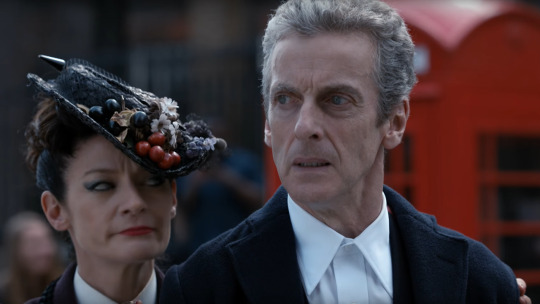
I wanna talk about Missy. We’ll get back to Simm later.
Now Missy’s appearances are built up throughout series eight and it’s clear she’s planning something. She seems quite elegant, if not a bit eccentric. In Dark Water she has quite a few scenes with The Doctor- kissing him, claiming she’s a droid, obviously not being a droid, mocking The Doctor and the actual reveal scene.
The reveal itself takes place a minute, if not less, before the episode ends and Missy says nothing for the rest of the episode. So why is this so memorable? At least, in my opinion…
The music, the filming and The Doctor’s face are probably all good candidates as to why. Though I personally think the lack of speaking is what makes this scene so great. Missy’s reveal is unique to her; she has spoken quite a bit before the reveal (both in the episode and the ones beforehand) so she purposefully doesn’t. The lack of speech, just letting her words truly sink in and letting the meaning of them- just how much shit The Doctor’s in- really be understood. As nice as a monologue would be, it weirdly suits her.
Shall we get back to Simm?
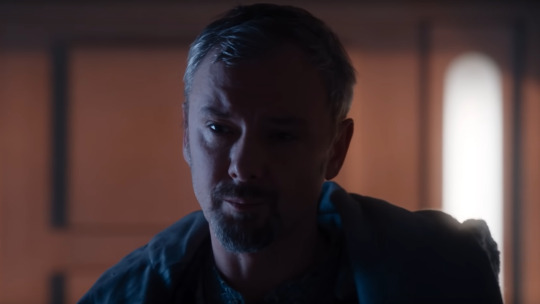
Oddly enough, he is revealed at about two-and-a-half minutes before the end- though because he was in the trailers, I’m sure many people guessed who he was the second he started talking to Missy. But I digress.
He spends years, more than we even see clips of, in disguise- playing the long game and plotting. We come to really like him, really become attached to the façade he puts on. But the person he loses that façade for? Himself. And no, I’m not talking literal. Around Missy, he doesn’t remotely bother pretending to be nice or funny, he begins his build up to his reveal. It’s obvious he takes great joy in all of this scene.
The unique-ness of this reveal is who it’s to. It’s a reveal to Missy, who seems concerned (if not scared) of her past. His response to her is to say he’s “worried about his future” which, in my opinion, is clearly him trying to upset her more. He’s also quite calm, wanting to appear sinister to himself, and seems to be trying to impress Missy.
It’s very interesting, if not confusing to anyone who hadn’t seen previous episodes. I mean, this has got to be the reveal that makes the least amount of sense to new viewers… Regardless, it’s a very memorable moment.
Onto the new guy!
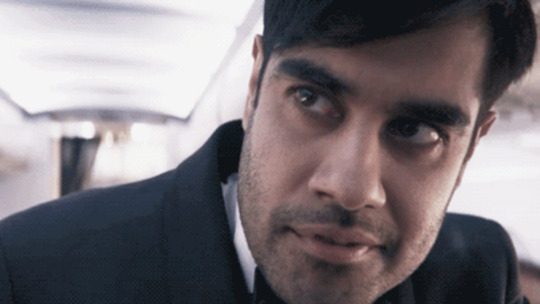
Now this wasn’t set up, it came right in the first episode of the series which automatically makes it unique. He officially says he’s our man at about four minutes before the end, and he spends most of that time monologuing. He flaunts just how evil (and wonderful) he is, taking in The Doctor’s horror and the companion’s shared confusion.
New viewers can relate to the confusion of Graham, Yaz and Ryan while older fans can feel the shock that The Doctor feels (if not with a bit more excited squealing).
What is so good about this reveal is the fact that O is someone who The Doctor trusts, and even insists that they employ the help of. This isn’t The-Master-without-his-memories or Missy-not-exactly-trying-to-be-quote-on-quote-“friendly”, it’s someone who has been texting The Doctor, has many files, is someone she genuinely likes. It’s playing the long game, but more directly so. It’s classic undercover and classic Master.
Simm went undercover as Razer primarily to hide from the people he fucked over and bring about the rise of the cybermen, The Doctor and co turning up was just a plus. This is well-planned and specifically aimed at The Doctor. And it really fits- mostly because Thirteen is such a warm, friendly, trusting, benefit-of-the-doubt style Doctor. This makes it such a gut punch, to the point where The Doctor doubles over.
Overall, Master reveals are truly iconic. They are usually the greatest scenes from that series, or even that Doctor’s run. They’re the first impression of a brand new regeneration of one of the most memorable characters in TV history. Dhawan is no exception and, if he had never appeared in any other episode (Derek Jacobi style), we would still hold those four minutes of jokes, threats, sinister-ness, mind-blowing-ness, flaunting and monologuing up as a great iteration of this character.
So wow! This was long as anything, but I needed to post it or I would’ve just screamed at my family about it and they’re getting so bored at this point.
#doctor who#doctor who series 12#doctor who spoilers#the master#the master (simm)#missy#derek jacobi master#the master (dhawan)#o#spyfall#utopia#dark water#world enough and time#ta-da#analysis#is this my analyising?#or just rambling
130 notes
·
View notes